#and that their many multitudes do not undermine each other
Explore tagged Tumblr posts
Text
By the way, I love how everyone in Idolish7 is never just one thing. Yes, Iori has a cool aura and is very master-of-all-trades analytical...but he also is a guy who loves small and cute things and just kinda wants to support people he loves and also is asocial as one can be. Yes, Yamato is like the lazy but friendly older brother figure with dirty jokes...but he also has incredible trauma from secrets kept to him and wants to love his friends so much in the right way and also has a pet rover named Musashi. Yes, Yuki is the cool and distant playboy male lead trope....but he's also someone who tried so hard to stop that behaviour and is actually doing better in trying to communicate and value other people! Yeah, Tenn is a two-faced angel-demon who takes his work way too seriously and K.O.s people with one insult....but he's also way too self-sacrificing of his own good and values people so much to his own detriment. And Riku being the cute and oblivious airhead who is kinda spoiled....but also trying so hard to be more than the sheltered kid he was raised as, having so much talent, loving books a lot. It's just them being character archetypes from animanga, and the writers having fun with that, but also making them more without disparaging those stereotypes
#i want to go on with the other characters and i didnt even do any of zool (im so sorry zool...i do love you a lot though)#but i didnt want this post to get too long#here ill do one in zool in the tags#yeah minami is snakelike and mildly possessive a bit like the yandere trope....#...but he is also so sincere and has issues stemming from being used as a child not to mention his love for piano and composition...#...is genuine#his soft side is as real as his possessive side#fandom spamdom#idolish7#note's notes#I JUST LOVE CHARACTERS WHO ARE MULTIFACETED#and that their many multitudes do not undermine each other#riku can be philosophical and clueless#iori can be a tsundere and such a sincere weirdo about people he loves#tamaki can be rude and self defensive and also emotionally intelligent and kind#and so on#guys help im having fictional idol brainrot....
18 notes
·
View notes
Text

hallo and welcome, new friend !! its a pleasure to make your acquaintance >ᴗ< please do take your time to thoroughly peruse these here guidelines ‧₊˚♪ 𝄞₊˚

𝒞𝒪𝒰𝑅𝒯𝐸𝒮𝒴
◜ i do not entertain requests for specific content; they will be promptly discarded upon receipt.. however !! if you are inclined to share your adorable musings about the characters and fandoms i focus on, you’re more than welcome to do so !!
↳ bllk ᦾ jjk ᦾ love and deepspace ᦾ genshin impact ᦾ haikyuu ᦾ my hero academia + tba..♥︎
◜ i firmly abstain from crafting narratives of an explicit nature ( nsfw ). while i understand the appeal of such content for some, the very essence of my writing is one of purity and wholesome emotions !! more so, me being a minor further reinforces the idea that producing such content is not only not my preference, but also inappropriate in my current age. please do not cross the line between healthy creative expression and content that is not suitable for young artists.
that’s not to say though, that i hold something against those who write nsfw !! everyone is free to express themselves through their craft as they wish ♥︎
◜ i take great pride in my creative endeavors, and thus firmly prohibit any form of plagiarism in relation to my works !! it is not only a matter of respecting the efforts i put into crafting my stories, but also acknowledging the importance of originality and authenticity in artistic expression (ㅅ´ ˘ `) plagiarism not only undermines the integrity of the creator’s work, but it also denies them proper credit for their ideas and hard work !!
please do not plagiarise me, or other creators here !!
◜ my fanfics are delicately crafted to resonate with the hyper feminine readers, embracing a style and content that may not align with preferences leaning towards stronger, more masculine elements. if my stories don’t spark your interest due to their focus on female-oriented!reader, that is perfectly alright !! there is a multitude of amazing fanfics out there that may cater more to your tastes !
◜ i am an unhurried writer, taking pleasure in crafting my stories at a pace that suits my creative process. while it might be tempting to inquire about the timing of my upcoming fics, i kindly request patience and understanding. rushing the process only hampers the quality of my work, (◞ ‸ ◟ㆀ) …. and my creative spirit thrives best when i work according to my own timetable ! i think !!!
◜ my intention is to create a positive and respectful environment for everyone. hence, i will not engage with rude, inappropriate, or otherwise unpleasant queries or discussions. while creative expression may take many forms, it is crucial to maintain a sense of decorum and basic decency in our interactions.
i believe in fostering a space where all participants can express themselves freely without fear of being subjected to negative discourse. let’s all be one happy family in peace and understanding ! ☮️🙆♀️
◜ if you wish to break the mutual, kindly consider a hard block to clearly signify this break !! a soft block, on the other hand, might leave me under the impression that we remain part of each other's circles, thereby potentially causing confusion or misunderstanding.. && i wouldn’t want to make anybody uncomfortable !!!

2 notes
·
View notes
Text
From the Curieux manuel de dramaturgie pour le théâtre, la danse et autres matières à changement. The excerpt from my text Individualism Was A Mistake (But We’ll Miss It When It’s Gone) that I read at the launch: “With every collaboration I’ve ever been a part of, the overarching goal was to make something that would be performed in front of an audience. Collaboration was never an end in and of itself. For me, the idea of art has always been connected to the idea of an audience. I’m attracted to the possibility of making something and keeping it secret, but I’m attracted to it mainly because it undermines most of my key conceptions regarding art. For me, art is when you make something and attempt to show it to a large number of people over time. When you do so, you put your name on the line. You invite judgement. People can say you’re a good or a bad artist. (Or a good or bad collaborator? But since they weren’t present during the process how could they actually know.) As the prospect of an audience grows closer, this sense of an impending judgement always creeps into the process of the collaboration and often begins to dominate. As we know, this business of the “artists name” is deeply connected to capitalism. An artist puts their name on a work so that they are able to profit from it. It is significantly more difficult to profit from a highly collaborative work. And the more artists involved in the work, the more difficult it is for each individual artist to profit from it. However, what I have found most depressing over the years is how difficult it is for a collaborative group to collectively profit from their collaborative work. Art institutions almost always gravitate toward presenting art as something made by a single name, no matter how many people worked on it. And despite all my longing for collaboration, I cannot deny the incredible charge I get from seeing my own singular name printed on a giant poster or on the cover of a book. For me, every time this happens, I feel a little bit like my ego is on cocaine (followed by the slight hangover of guilt for having such a big ego in the first place.) I worry this feeling is a large part of what has undermined my ability to make collaboration a more satisfying and effective part of my artistic life. Even though so much of my life has been dedicated to artistic collaboration, the cocaine-ego feeling of pushing my singular name too often wins out. I realize that many (or most) artists don’t even question this aspect of the state of things. Never question their name on the poster. Never question why their name is a priori the most important one when others worked on the project alongside them. I have questioned all of this a great deal but with what results? Nonetheless, I simply can’t live with the fact that so often the underlying meaning of art is that people accomplish things alone, that the artist makes the work and has a final say in its authorship. Since no one does anything alone. Everything is part of an interrelated web. […] What is an artistically productive compromise? What does it look and feel like? I still don’t really know. But I do know that I absolutely don’t want it to be about sanding down your personality or your desires to suit the needs of the group. I am hoping for strong individual personalities that together search for, and hopefully often discover, a multitude of different ways to effectively work together. And find equally useful ways to manage the many conflicts that arise along the way. I don’t need to be less of myself in order to connect with your point of view. A compromise is not that I have to completely give something up, but rather that I come to see the value, in the moment, of doing something differently.”
1 note
·
View note
Text
⚜ ROTHSCHILD DYNASTY ⚜ LIGHTING INVITATION.
⚜ We invite you to the noble role of the great Illuminati, in which the charism and elites are defended with the objectives achieved and the objectives for their members. By creating this destination online, we strive to bring order to a world full of chaos and lack, lighting a candle for all those who walk down the street while the night reaches its darkest point. The Illuminati promise to turn around and make you famous and rich by expelling the difficulties of poverty that affects society without privileges, each step forward brings you closer to the joy of abundance. Follow the light, the Illuminati always watch over you. Welcome to the new world order Say hello to ILLUMINATI WE ARE THE OPTIMUM ™ RULES. OUR PURPOSE
OUR PURPOSE
Dear Influential Individual,We are enchanted that your life’s excursion has driven you to find our association. Perhaps you have met one of our individuals in person Or on the other hand maybe not; we esteem obscurity. We see and realize all similarly as a shepherd sees and knows the entirety of the herd, our eyes peering over the majority to recognize any risk to the endurance of the human species. We are the bearers of new sunrises, the gatekeepers of the human species. We are the Pyramid, the Eye, the Light, the Eternal Circle. We are the Illuminati.
The Illuminati is an elite organization of world leaders, business authorities, innovators, artists, and other influential members of this planet. To apply for membership, kindly contact us
🔺👁️🔻
The people of ILLUMINATIAM
Millions of people from all walks of life have engaged in the worldwide Illuminati work for the betterment of the human species. By renouncing all divisions of religious, geographic or political beliefs, the followers of Illuminatiam strive to form a planet where all human beings, everywhere, can live in abundance.
GOD OR SATAN
FAITH IS BELIEF IN SOMETHING THAT CANNOT BE PROVEN.
Most religious beliefs are based on information received from an outside source that cannot be verified, sometimes referred to as hearsay. Millions will follow the commandments of a religious text without ever telling its author, and billions will believe in a deity because of the miracles they have been told about by someone who was not even present or living there. 'era.
But denouncing the faith is real madness. Faith is not limited to religious believers. While even the most pious pontiff cannot provide irrefutable proof of the existence of his god, neither can the scientist who claims that no deity resides in the universe. Both rely on their own faith to explain things they will never understand.
There is no proof of God. There is also no proof of the absence of God. If science cannot definitively prove that there is no God, then science has no choice but to accept the possibility of the existence of a god.
The deepest doubt builds the strongest faith.
The religious foundation of the Illuminati is based on this universal conundrum of faith and doubt. We are not concerned with whether or not a god exists, but rather we focus on improving the human beings living on this planet. Our decisions are made by studying data and evidence - factors that can be easily changed by an omniscient creature to guide our actions and the future of humanity.
Beware of those who use our name.
For decades, a multitude of individuals have operated under the name of the Illuminati - their deception obscures the public perception of our organization, leading many citizens to believe that wrongdoing is being done by our command.
For anyone who claims that the Illuminati are affiliated with a religious belief - be it God or Satan, Baphomet or Baal - undermines the very purpose of our independence from human divisions. We do not accept or deny any deity and we consider that no one is superior to any other. We operate only for the benefit of the human species we have been charged with protecting.
0 notes
Text
Interspecies encounters, togetherness, irreducible strangeness when creatures meet, caring for “the multitude of life we cannot sense”:
Ada Smailbegović talks of starfish time (2015). Starfish may seem to be still, but longer attention, through time-lapse photography for example, shows them moving, changing. Smailbegović also talks of larval time, the time it takes for eggs to develop and hatch, a time that is a compound entity of other variables, longer in the cold, or sped up with increasing temperature. Larval time is the right time for eggs to hatch, a deeply relational and contingent time. As she points out, “many of the temporalities that are relevant for developing a politics of time in the Anthropocene – such as minute and incrementally accumulating processes of change, or the long duration of geological time, rock time, or the temporal rhythms of non-human organisms – are beyond the human sensorium” (2015: 97). [...] For by attending to more-than-human agencies of time and weather, diverse multiplicities emerge even as they are beyond human understanding. This is the seasonal time of clouds gathering. It is also the time of hydrological cycles, of water moving through aquifers for thousands of years, of transpiration and growth. And short spirals, of the flash of lightning, claps of thunder, of traveling sound and light. Then there are beings that experience hundreds, thousands of generations within a human lifetime. For such beings, the memories, learnings and modes of passing on experience are, it almost goes without saying (yet it must be said as it is so often not), radically different from any human’s in terms of the ways they experience change. The immensity of the alterity is, literally, incomprehensible to humans. We can’t know how and what these beings know. But we can be aware that they have knowledges and experiences beyond us. For many people, coming from different cultural and ontological positions, not knowing does not mean not connecting or not respecting. For it would seem that there are things that humans cannot and should not know. We don’t need to know what starfish know. But we should know they live and experience and think beyond us. We should seek respect and be aware of how our lives are entangled [...]. It is not abstract, or empty.
(Source: Bawaka Country including, S. Wright, S. Suchet-Pearson, K. Lloyd, L. Burarrwanga, R. Ganambarr, M. Ganambarr-Stubbs, B. Ganambarr, D. Maymuru. “Gathering of the Clouds: Attending to Indigenous understandings of time and climate through songspirals.” Geoforum. January 2020.)
-------
We can now turn to abundant evidence that nonhuman creatures matter politically, ethically, and that they pulse with world-making vitality. [...] Studies of microbes have charted the importance of alienness and difference in processes of becoming. Helmreich’s study of microbial oceanography suggests that “the lowly microbe constitutes a force of leviathan significance” for life, but also witnesses the sense of alterity that this vast cosmos of microorganisms in the sea evokes in humans. […]. Taken together, such studies shift agency away from the bounded figure of the human and underline the indifference of the many inhuman forced folded within us. Attending to microbial life also points us to animal others that […] we do not (like to) see or touch. […] We are more intimately familiar with them than we like, but at the same time they remain alien to us, catching us in what Hugh Raffles describes as the “nightmare of knowing and the nightmare of nonrecognition.” This opens up space for friction, conflict, and misrecognition within togetherness […]. For every meeting between creatures involves an irreducible strangeness, and something singular, irreducible and vast behind each relation. […] There is a distance between beings when they meet, a multitude of life beyond sense and matter, and flourishing and togetherness emerge from this “virtual ecology.”
(Source: Maan Barua, Uli Beisel, Franklin Ginn. “Flourishing with Awkward Creatures: Togetherness, Vulnerability, Killing.” 2014.)
-------
Such otherness can be seen in work concerned with dimensions of human–animal conflict which is full of depictions of strange, disturbing, fraught, chance, and violent encounters. Whether the challenges of coexisting with coyotes or cougars in North America [...], the growing presence of Macaques in the borderlands of Singapore [...], shark catch and kill policies in Australia [...], or the verminization of rats in urban areas [...], notions of encounter are central to accounts where non-human animals are somehow rendered out of place or too close for comfort [...]. Many examples of human–animal encounters are about the breach of spatial and regulatory boundaries – home spaces, urban borderlands, safe swim zones, and so on – but the distinctions of human/animal, society/nature, urban/rural, domestic/wild that are central to these renderings are a reminder of the colonial knowledge-practices that continue to define humanity on the basis of the separation between humans and animal [...]. A concern with the dangers of one-sided accounts in the context of unequal relations is one that has been central to multispecies work, which has raised challenging questions about voice, interpretation, and decipherability [...]. An encounter is an event of relation – it is about two beings or things that are momentarily held together. Encounters make (a) difference [...] and are often experienced as something that disrupts, unsettles, or surprises in ways that can be as affirmative as they can be violent. [...] [W]hilst encounters can highlight distinctions, and thus forms of separation or psychological and cultural distance, it is important to emphasize that they are also events of relation. The experiences of shock, surprise, and rupture that so often accompany accounts of human–animal encounters are evidence of a moment in which something is destabilized or unexpectedly broken open; a moment in which borders are shifted, exposed, crossed, made, unmade, and undermined [...]. Encounters, then, do not simply take place at the border, and are not simply about existing borders, but are rather central to their making and unmaking [...].
(Source: Helen F. Wilson. “Contact zones: Multispecies scholarship through Imperial Eyes.” Environment and Planning. July 2019.)
-------
Slugs, like other often uncomfortable companions such as microbes [...], bees [...], cougars [...], test our resolve to live ‘convivially’ with non-humans [...]. Yet live we must, for the lives of humans and slugs are stuck together. Composition is the work of building a common world [...]. It is, simply put, how things come to stick together. [...] [A]gents and materials are never distributed in time or space according to [...] the authorities of Modernism [...]. In this the composers are certainly not all human [...]. [In some cases] the stickiness of composition leaves a residue that echoes through time, as narrated by [gardeners] shifting their sense of what is possible and good in their gardens after an intense connection reaction to slug death. [...] [E]very [interspecies] meeting in fact reminds us that the being we meet is and always shall be strange to us [...]. [E]verything is not just related, but also that there is something singular, irreducible and vast behind each relation. When beings meet there is a distance between, such that in encountering the slug we also encounter something beyond the slug -- a multitude of life we cannot sense. The ethic that emerges from this space ‘between relation’ is, as Yusoff puts it, part of a ‘virtual ecology’ that exceeds encounters with matter. So despite shared histories and the close proximity in which slugs and gardeners live, the slug retains a certain darkness as a creature apart; something is held in reserve [...]. And so fleeting awareness of the irretrievability of the lives of others intensifies poignancy, such that despite a gulf separating the gardener from other creatures, some connection, however, fleeting, is made to something -- however strange. Refusing to dismiss the everyday and the banal is an ethical response. [...] Slugs are there: sliming, chomping, and oozing around quietly and that should be enough to give them consideration.
(Source: Franklin Ginn. “Sticky lives: Slugs, detachment and more-than-human ethics in the garden.” Transactions of the Institute of British Geographers. 2013.)
416 notes
·
View notes
Text
Tangled Salt Marathon - Who’s Afraid of the Big Bad Wolf

Ok, so I’ve tried and tried several times to get this posted, we’ll see if this is the time it goes through. Half the reason why this review series has slowed down is not just the multitude of real life stuff I have to deal with, but also Tumblr just refusing to work with me and deleting my posts. I also can’t save my work else where due to Tumblr messing up the formatting. It’s been a frustrating mess and so far no one @staff has come up with a tech solution or work around.
Summary: Rapunzel helps to rebuild Old Corona, (after its near destruction from the Black Rocks) which will become the permanent home of Red and Angry, who have returned to Corona to settle down. However, she begins to notice strange footprints around the area, as well as the livestock becoming more unruly and fearful. The group comes across a monster hunter named Creighton, who explains to the group that the area is being stalked by a werewolf, who possessed one of Corona's citizens. Aiming to save this person rather than kill them, Rapunzel sets out to find who it is.
When Was This Decided?
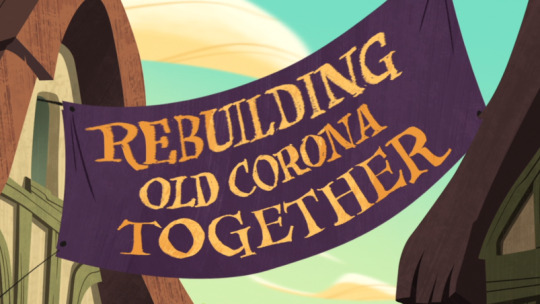
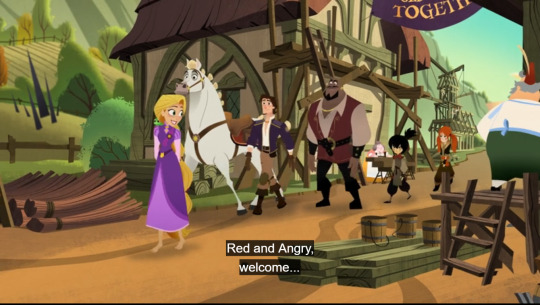

No seriously, when was this decided? It’s a pretty big leap go from ‘the rocks makes various towns inhabitable’ to ‘let’s rebuild!’ What’s changed here? Cause the rocks haven’t been removed and Rapunzel failed in her mission to nullify their power. In fact the rocks were not only reawaken in the second season finale but shown to be under the power of someone who’s intentions were made unclear to the heroes.
So I ask again; who thought this was safe thing to do now? What provisions have been made to accommodate the rocks? They blocked the well, remember, and destroyed the fields; how are the people getting food and water?
And most importantly why wasn’t the audience informed beforehand? When you change up the status quo in a story you need to provide just cause to the viewers. I legit thought I had accidently skipped an episode when I first watched because this plot point was not set up properly.
Why Were They Ever Left Alone to Begin With?
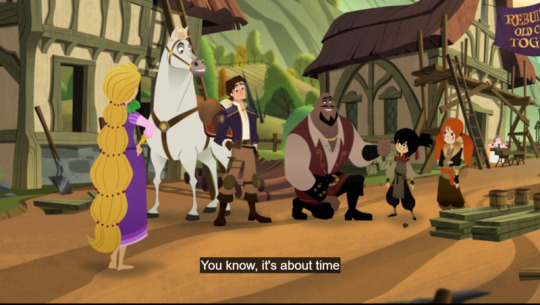

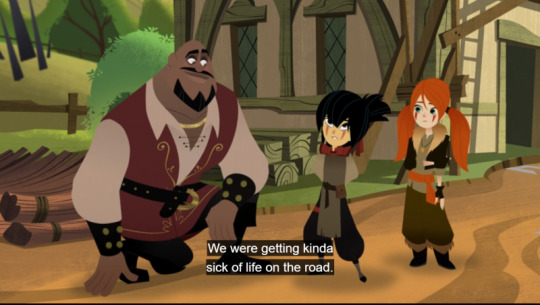
In a story where neglect is a central theme and motivating factor for all the main characters, it is super tone deaf to have those same characters perpetuating neglect themselves. The decision to live on their own should not be left up to Angry and Red because they are children. Children are not mature enough to provide for themselves neither emotionally nor physically and when placed in situations where they have to do so it psychologically damages them. Which the series already showcased with Varian so why is this suddenly deemed ok?
This Completely Undermines the Past Two Seasons
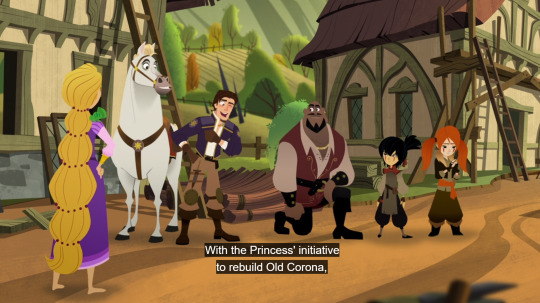
The entire conflict of the past two seasons was the rocks forcing people out of their homes. Eugene was made an orphan from them, Varian lost his entire support group because them, they drove out the Saporians from their encampment which prompted them to invade Corona, and Rapunzel and company spent an entire year on the road trying to find a way to stop them from spreading supposedly.
All of that has now been flushed down the drain with this decision. And its super insulting to watch because it’s the writers telling us that we’ve wasted our time caring about this plot for two years. You don’t resolve major conflicts off screen and without explanation; it’s lazy!
Also Where Is Varian and Quirin During All This?
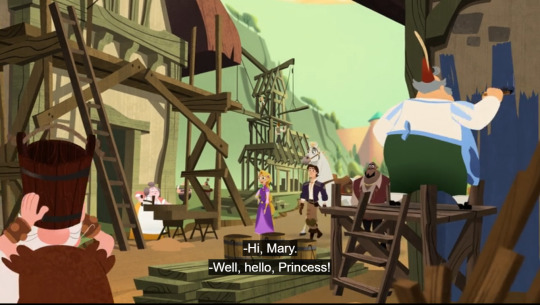
This is not only their home and legal charge, but it’s also the ending to their ongoing story, and they’re not even here in a silent cameo.
Wouldn’t Quirin be overseeing the rebuilding of his town? Wouldn’t Varian be using his skills to find workable engineering solutions for them, fulling his season one goal of saving his home and making his village better with his inventions? Also wouldn’t Edmund want to catch up with his brother and help out now that he’s here?
In fact not a single person who actually lives in Old Corona is to be found in these opening shots.
Oh, But We Do Get Earl

Earl might be from Old Corona, or he might not be. We’ve literally never seen him before. The artists had to create a brand new character model for this character, the writers had to write new lines for him, and the casting director had to hire an actor and have him record these lines for only less than a minute of screen time, never to be seen again. Even though they legit had shepherd models already to go from season one that they could have used. It’s a waste of resources and a prime example of the mismanagement going on in this show.
It’s Too Late In the Series to Waste Time On a New One Off Villain

Speaking of a waste, Creighton might have more story reasons to appear in this episode than Earl does but her inclusion is still a poor decision. The show already has an overabundance of villains, so many in fact that they shipped the bulk of them off in season two, and this is the final season; the season where we should be wrapping up plots and minor characters stories not kicking off new ones.
Taken on her own Creighton isn’t a bad character presa, she works for the episode, but when we could have gotten a resolution to Caine’s, Hector’s, or the Disciples’ story arcs instead it highlights how misused the series assets are.
All This Lore Will Be Forgotten In Just a Few Episodes Time
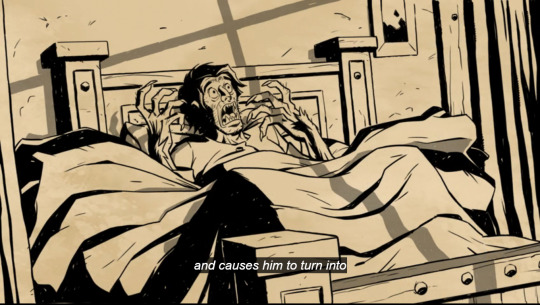



We finally get like some magical rules and backstory only for future episodes to ignore it from here on afterwards. Red can turn into a werewolf whenever she pleases, night or day, with little explanation as for why.
Just Arrest Her Rapunzel
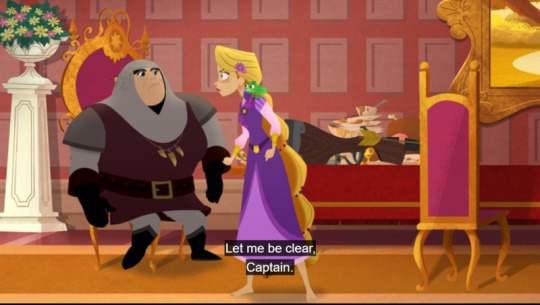
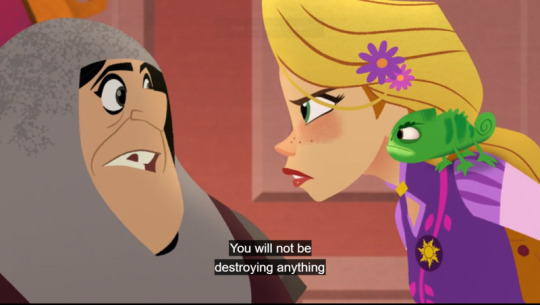

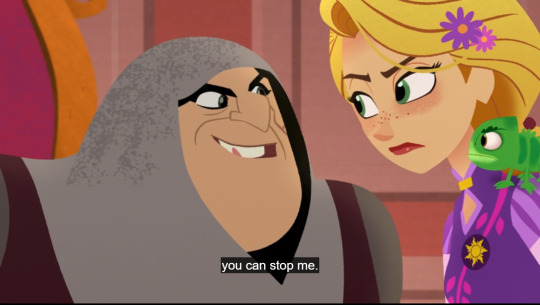


You’re the acting queen. You have the power and the right to arrest or even merely detain someone who is threating your citizens and refuses to leave. In fact it’s kind of your job. You don't even have to throw her in a dungeon if you thought that too cruel. Just lock her up in a nice room somewhere in the castle until you’ve sorted out the mess yourself.
The series wants to treat Rapunzel as the underdog when she isn’t, and her failure to wield her power effectively doesn’t make her look ‘nice’ it just makes her look stupid and grossly incompetent. This is a conflict that didn’t need to have happened and Rapunzel let it happen.
Oh, So Now Y'all Riot


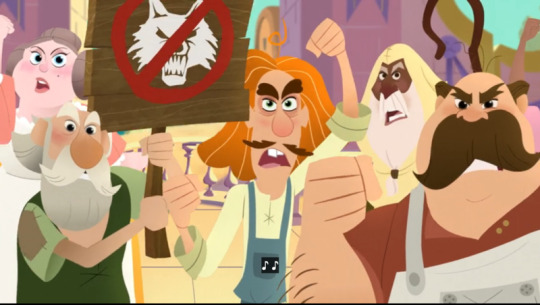
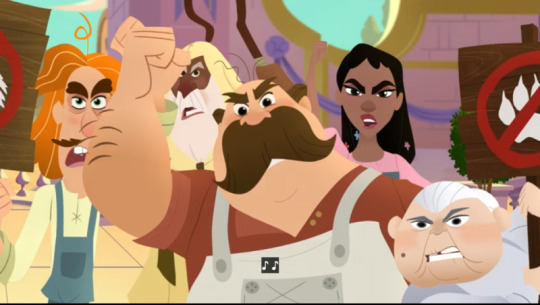

You didn’t complain when the king orphaned children with his crack down on crime. You rolled over as he dolled out overly harsh punishments to poor people who committed minor offences. You gleefully went along with the royals as they scapegoated a child for their mistakes, even as they endangered your homes. And ya’ll sat on your asses while invaders pulled off a coup and enslaved you.
But this is what you get mad over? A rumor about a mythical creature existing that your princess has zero control over. Seriously?
Man, I hate the townspeople in this show.
Pointless Dream Sequence Is Pointless
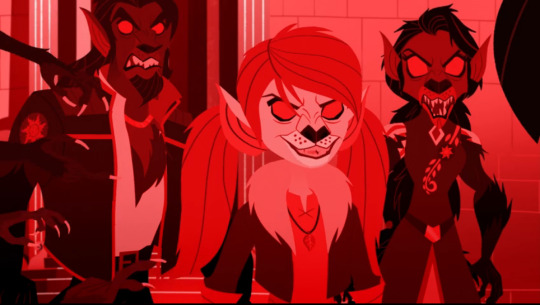

This scene tells the audience nothing new and just wastes screen time.
This Is the Wrong Lesson to Focus On Rapunzel
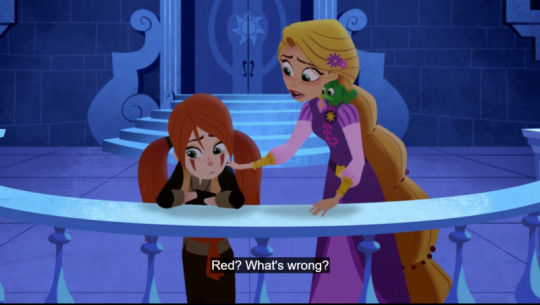
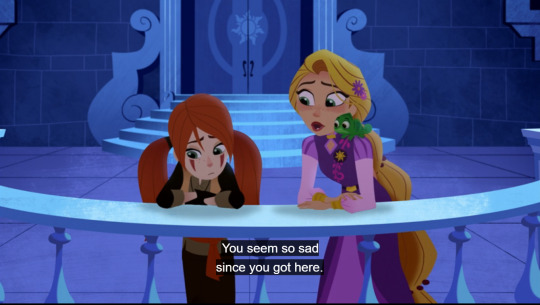
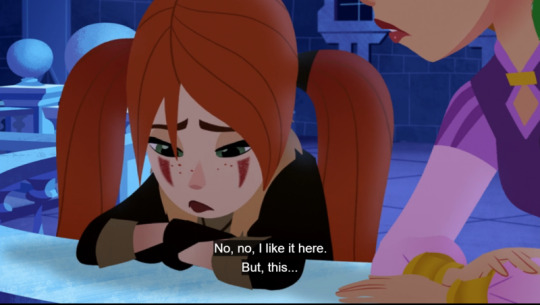
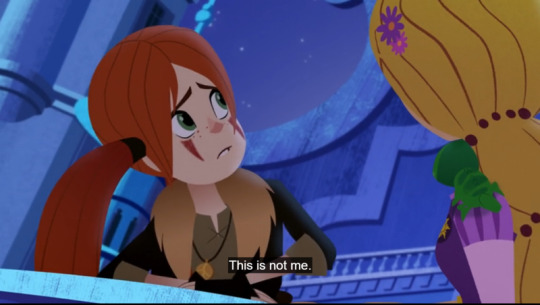
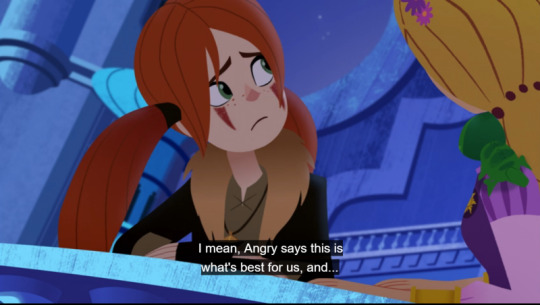
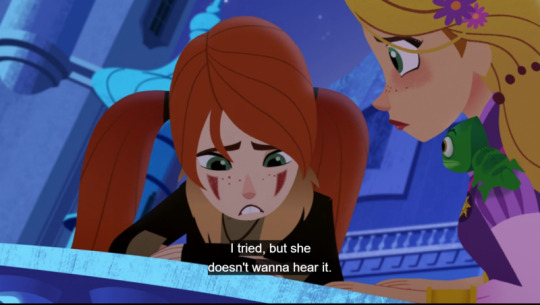
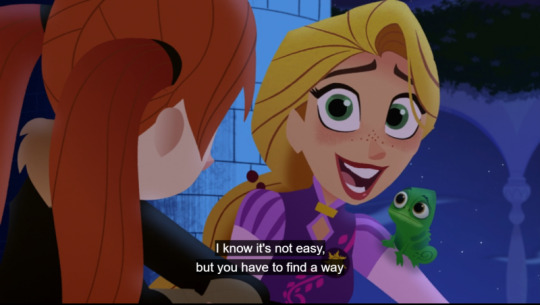
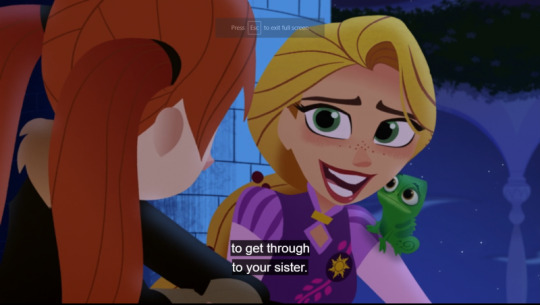
We do not tell the 12 year old to unload their phycological issues onto their baby sister!
You’re telling me parents were involved in writing this show? What the hell!?
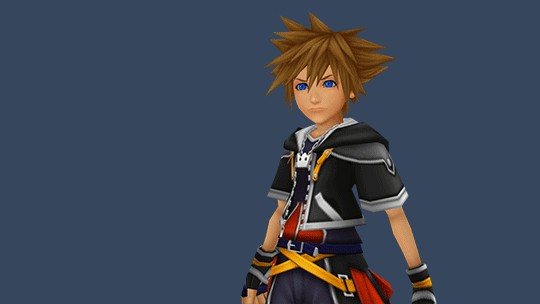
Rapunzel you are the adult here. At 20 now you should be more adept to handle listening to the deep seated emotional traumas of a little girl than a fucking 10 year old! And if you’re not, or don’t want to, then it’s your job to find another adult who will.
That’s the core problem with this entire episode. It treats Red’s and Angry’s problems as some eternal issue that they need to work out and not as the inherent failure of the adults around them that it is.
It is neither Red’s nor Angry’s decision on weather or not they get live on their own. Nor is it their responsibility to be each other’s therapist. Yes, a change in living arrangements is always stressful and for children with abandonment issues it can be hard to readjust, but that’s when you need to step it up and deal with the problem; not shove it off onto the kids themselves!
Monty Is Useless



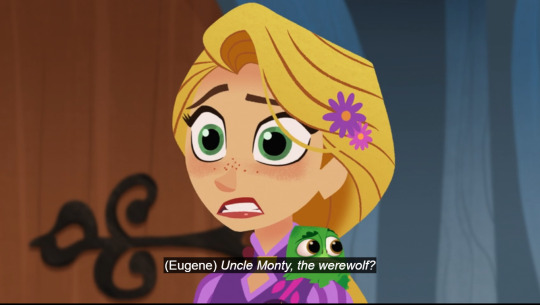

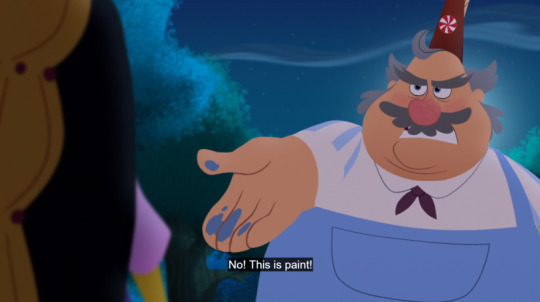
Is this all Monty is good for? Being a red herring in ridiculously simple mysteries? Is this why we wasted a whole episode introducing him back in season one? Really?
Why Are We Still Treating Old Corona As Being Separate from Corona Itself?


Look, I get that it’s a joke, but it’s a joke that highlights how poorly thought out the worldbuilding is in the series. Is the Coronan government in charge of Old Corona or not? If so then you can just make those lease laws yourself as the acting regent Eugene. If not then Frederic shouldn’t have had any say in the matter of relocating Old Corona’s citizens nor putting a child outside of his jurisdiction under arrest.
But more importantly this is a just a repeat of that vague level of responsibility Rapunzel has for people who live off the island. She can’t order a whole village to be rebuilt while simultaneously claiming that she bares no accountability for Varian and Quirin’s problems in season one.
Replacing Guns with Crossbows Isn’t the Safe Option That the Censors Think It Is

I find it kind of amusing that censors will ban showing a 17th century blunderbuss but allow it to be replaced by a weapon that is still mass produced today and can be bought in any Walmart across the country. Like I’m a major advocate for gun regulation in real life, but even I have to find this to be a bit silly. Crossbows aren’t some fantasy weapon. People still own and use them. But it would be seriously hard to get ahold of a working antique firearm.
Seriously This Is How the Girls Have Been Living and the Adults Haven’t Done Anything About It Until Now?


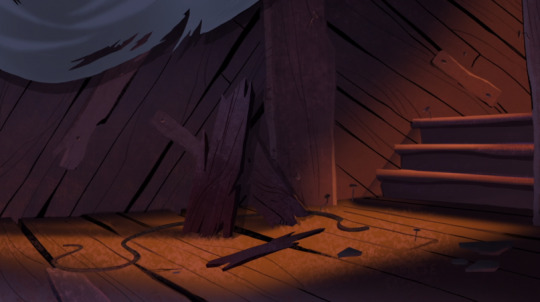

I feel like I’m beating a dead horse by now, but it’s so engrained into the episode I have to keep bringing it up. The show itself is visually telling us that Red and Angry can’t keep living this way, but it never wants to call Rapunzel and the other adults out for not rescuing them from this life sooner.
So All This Tells Me Is That Rapunzel Could Have Easily Checked Up On Varian In Painter’s Block, But Didn’t.
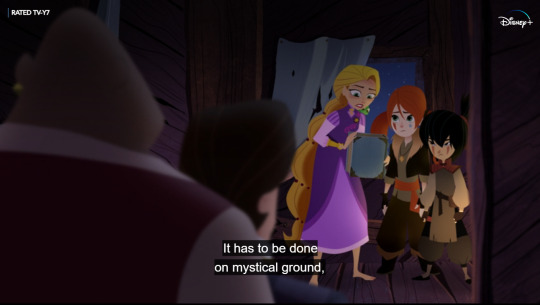
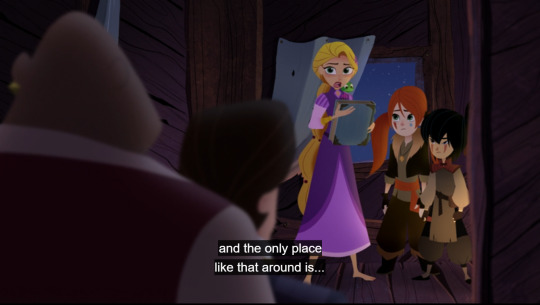
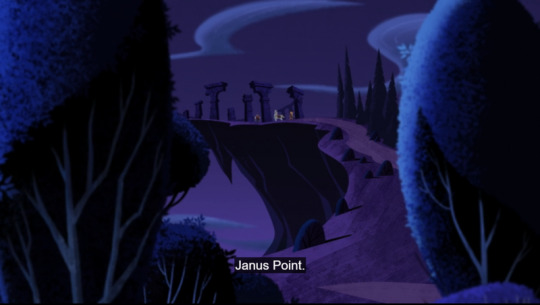
Remember they’re right next to Old Corona; meaning that Janus Point is also right next to Old Corona. Meaning that Rapunzel could easily have checked up on Varian right after Painter’s Block and choose not to. With each passing episode Rapunzel has less and less excuse for her behavior in season one.
Yeah Remember that Plot Point That Wound Up Being Entirely Irrelevant to the Story?

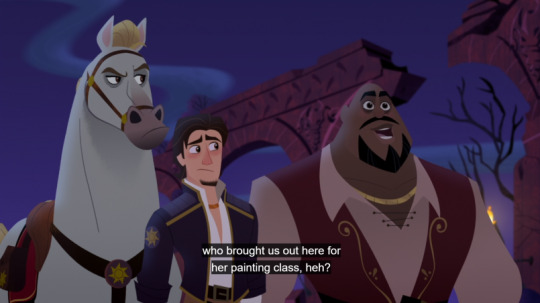
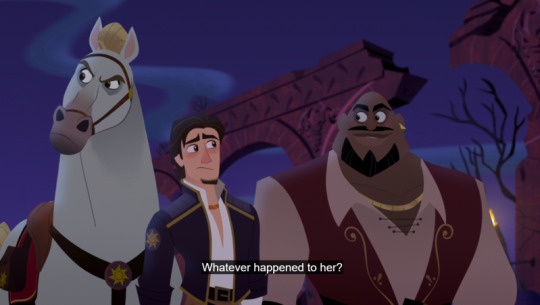
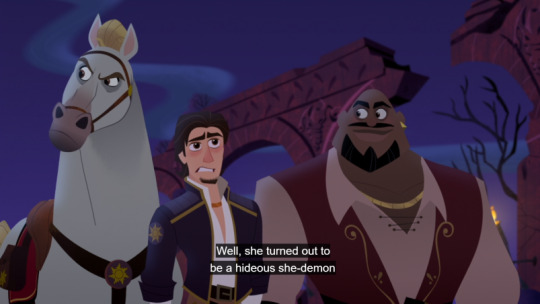
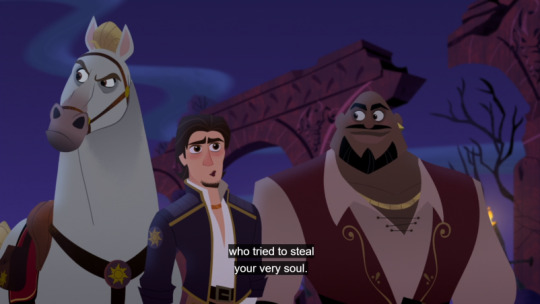
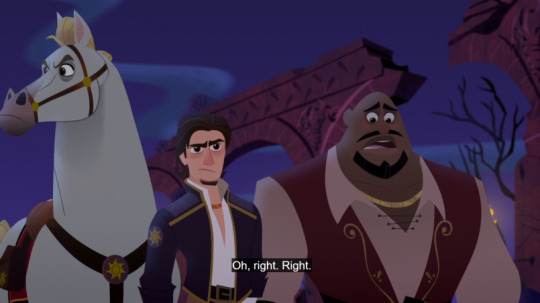
In jokes don’t cover your ass when you make poor writing choices. Quite the opposite in fact as all you’ve done is remind the audience of all the various dangling plot threads that you will fail to follow up on. The disciples plot goes no where and serves no purpose, and it should not have been introduced as this big important thing if you weren’t going to do anything with it.
Nice Idea, Poor Execution
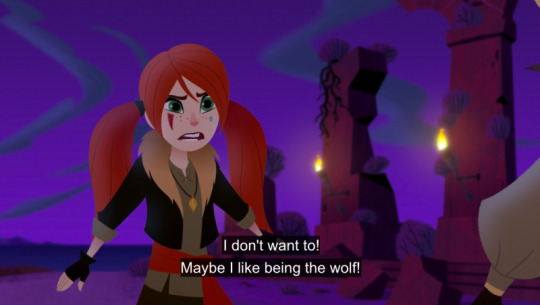



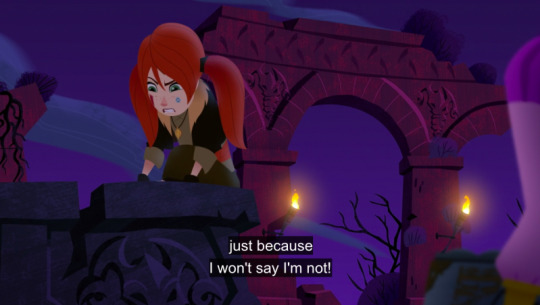


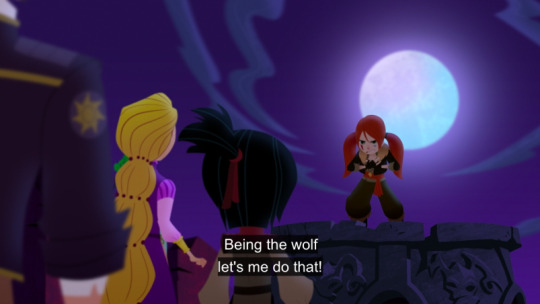
I’ve heard fans of this episode tell me that they enjoy it because of this scene with Red. If you’re a naturally introverted person or neurodivergent and have trouble communicating at times then Red’s speech here can strike a cord. Which is cool; I’ll never deny someone’s feelings and if a piece of media speaks to you on a personal level for whatever reason that is great. What I’m here to discuss though is story structure and whether or not the story’s themes are presented well in context of what it’s set up.
The conflict here does not work from a pure structural standpoint because it’s a surface level deflection of the real issues. Red’s problem isn’t that she is being ignored, it's that she’s been abandoned. Now communication issues can arise from that abandonment and feeling heard can be step forward in working those issues out, but Red’s central trauma isn’t going to be magically fixed by people ‘listening’ to her, i.e. being granted whatever she wants, but by providing her with a real home and with a real guardian to look after her.
Because what Red wants on a surface level is harmful to her, and the reasons why she wants what she wants needs to be addressed more so than then sedating her angry outbursts in the moment. This is treating the symptoms not the cause.
So What Is or Isn’t Real About the Curse?
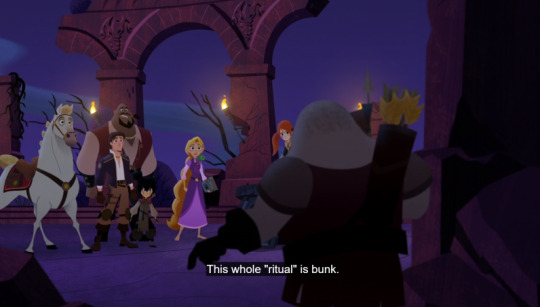

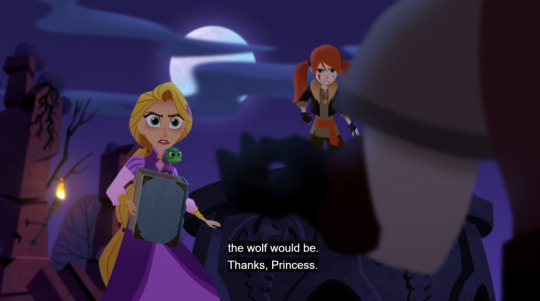
Once again, we finally get some actual lore and rules for magic and the writers are already throwing it away during the same episode they are introduced. I now have as little context for how the wolf curse works within the Tangled world as I did before the episode started.
This Is Sweet, But Once Again Context Brings It Down.

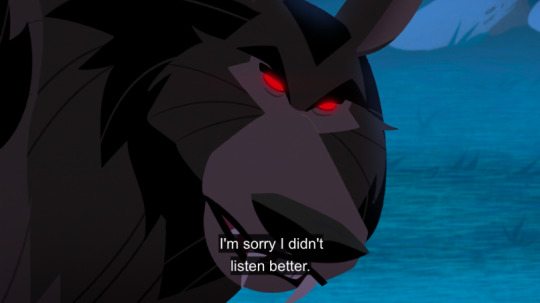
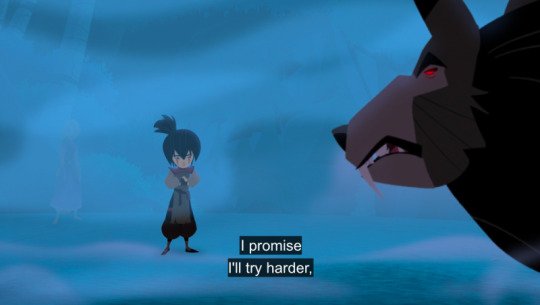


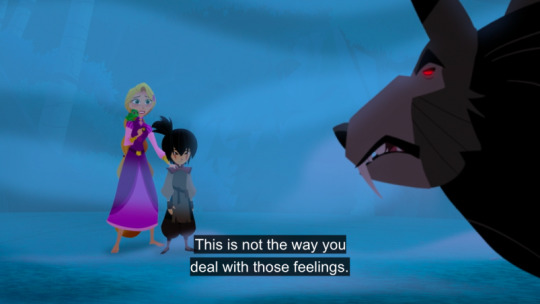
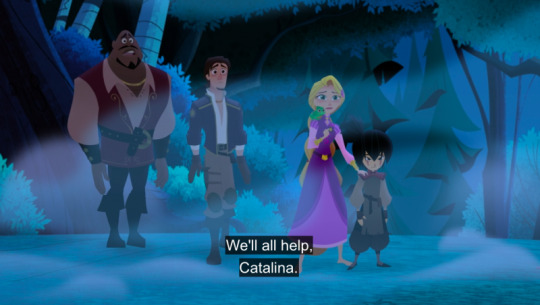
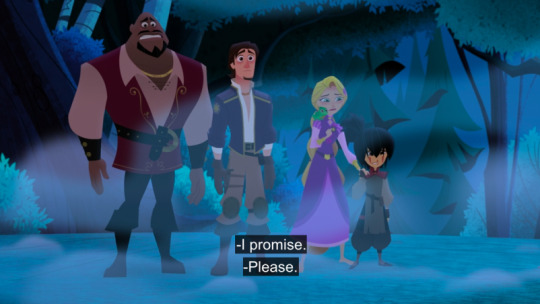

So just to reiterate, this a surface level resolution to the conflict of the episode that doesn’t actually address anything. It might feel like an appropriate ending but only if you ignore the fact that Red and Angry are orphans who’ve been abandoned but the adults.
Angry apologizing here to Red does not solve any of their problems, especially since Angry, as a child herself, is not responsible for her sister’s behavior, feelings, nor well being. That falls to the adults and they fail to address Red’s core issues and their own failings to her in their apologies as well. Not to mention that the very next scene undermines any optional progress that could have been made here.
Listening to Someone Does Not Mean Giving Them Whatever They Want

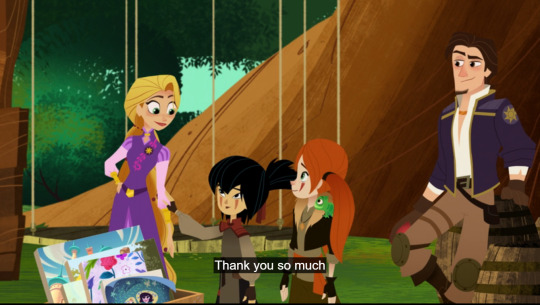

This does not fix anything. Red and Angry are still left to live on their own without any real supervision. Giving them a big play house is not providing for them, it’s spoiling them. Would you let all the other orphans in the local orphanage roam free without an adult to take care of them? No!? Gee I wonder why? Could it be because letting a 12 and 10 year old raise themselves is a very stupid idea? One that will potentially damage them later in life assuming that they don't get themselves killed in the meantime.
Moreover this is yet another example of the series overall problem with not understanding that compromise and resolving conflicts does not mean rewarding the characters at the end with everything that they want without having them work for it. That’s not how life works and it’s not how good story telling works.
This Is Beyond Irresponsible




No! Bad Show! Bad!
You do not get to pretend that negligence is the same thing as compromise. Yes I know Eugene said to come to him when they have a problem, but as demonstrated by this very episode children do not always know when to ask for help nor can they always find it when needed, that is why parents exist!
Nor does the show get a free pass for turning it’s main characters into child abusers who neglected three minors multiple times now. Even when they themselves are victims of that same abuse!
How utterly blinkered do you have to be to not see the problem here?
It’s the Return of the Pointless Parallels
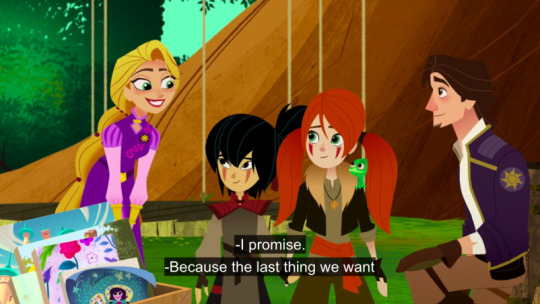

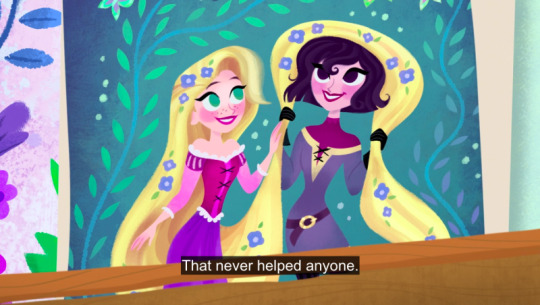
Let me count the ways for how stupid this is.
Red and Angry’s conflict has no impact on the on going narrative. Even with them now being reoccurring characters they still manage to contribute nothing to the future storylines involving Cass.
Neither Rapunzel nor Cassandra learn anything from Red and Angry’s spat; Rapunzel because she refuses to acknowledge her own flaws and Cassandra’s not even here for any of it.
The sister’s dynamic between Raps and Cass is not well established and the writers mange to piss all over it by series end because of gay baiting and poor writing. Therefore relying on lazy parallels to other siblings in the show to bolster this connection falls flat.
Red and Angry’s argument has nothing in common with Rapunzel and Cass’s current fighting. One is about abandonment issues and the other is about shallow validation. Trying to tie these two themes together actually winds up undermining both conflicts.
Red and Angry are children. Rapunzel and Cassandra are not. That very much matters.
Red and Angry didn’t drag innocent people into their petty bitch fight and endanger them because they wanted to feel special.
This Makes Zero Sense

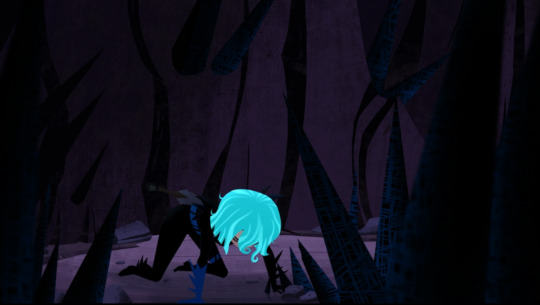
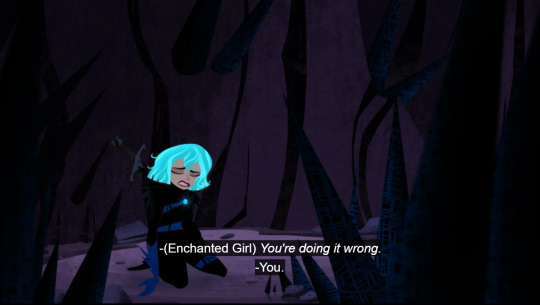
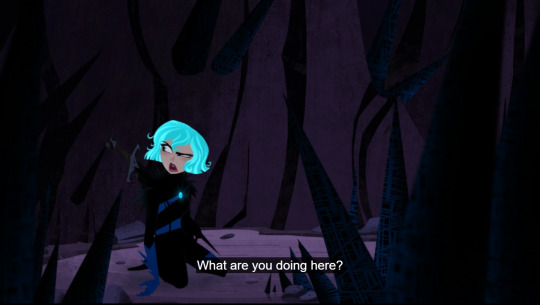

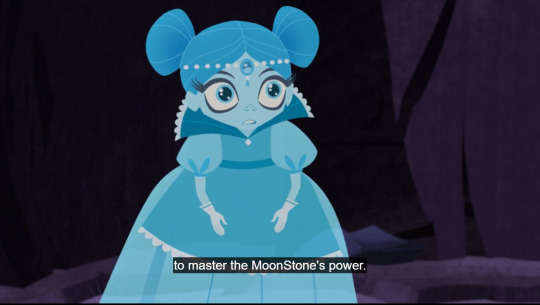

I don’t know; she looked pretty happy during Crossing the Line.

She was also able to control the rocks just fine then, so what happened?
Not to mention soon after this Zhan Tiri is telling her she needs some sort of incantation to control the rocks, despite being able to already control the rocks....
It’s almost as if the writers are full of shit and don’t actually know what they’re doing.
So Are We Remembering the Burnt Hand or Not?

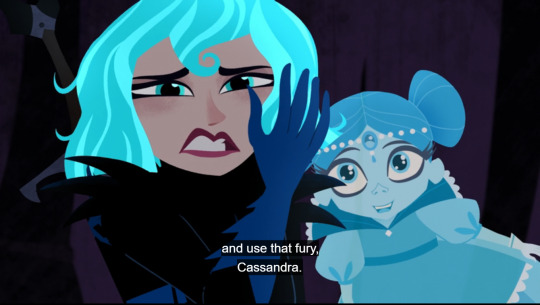
Does the hand matter or not? Is it ever a motivating factor in what Cassandra decides to do? Is her waning control over the rocks connected to her burnt hand; even though having a burnt hand is what allowed her grab the moonstone in the first place? Did the moonstone heal the hand? Does Raps singing the healing incantation later on heal it? Does Cass have a forever burnt hand?
Who the fuck knows!
Not the writers that’s for sure, cause it never comes up again.
Don’t introduce plot points and then not resolve them. That’s writing 101 guys.

Wait if she needs the incantation to control the rocks and the angry thing is a lie, then how the heck is she controlling them just now? Make up your dang mind show!
I swear I lose brain cells whenever I have to rewatch the evil Cassandra plot. It is so dumb you guys.... so, so dumb.
Conclusion
It’s not the worst thing ever but series has far better episodes on offer than this one. Even in a season as suck ass as season three.
So there’s praying that this review posts this time and if you enjoy my writing and would like to support me in my projects feel free to leave a tip on my Ko-Fi. Thank you.
https://ko-fi.com/rachelbethhines
71 notes
·
View notes
Text

The Kursk-Root Icon will be at St. Stevan Church on Saturday May 8, 2021. Divine Liturgy starting at 10:00 am. Everyone is invited and welcome to join us and receive the blessing of the Most Holy Theotokos. The Kursk-Root Icon is one the most ancient icons of the Russian Orthodox Church. In the 13th century, during the dreadful period of Tatar invasion of Russia, most of the devastated province of Kursk was emptied of people and its principal city, Kursk, became a wastelande. The residents of the nearby town of Rylsk often traveled to the site of Kursk to hunt wild beasts. One of the hunters, a pious man, going along the bank of the river Tuskora, 27 kilometres from the ruined city of Kursk, noticed an icon lying face down on the ground next to the root of a tree. The hunter picked it up and discovered that it was an icon of the Theotocos of the Sign. The Icon’s first miracle occurred, for as soon as the hunter had picked up the sacred image, a large spring of pure water gushed forth with great force. This took place on the feast of the Birth of Our Most Holy Lady of the Theotokos and Ever-Virgin Mary, September 8, 1295. The water became known for its miraculous healing power. With the help of friends, the hunter built a small wooden chapel and placed the newly manifested image of the Mother of God therein. Prince Vasily Shemyaka ordered that the Icon be brought to the town of Rylsk, which was done in a solemn manner. The people of the town went out to meet the Icon. But the prince, due to his lack of faith and piety, refused to attend the festivities, and for this reason was punished with blindness. The prince, acknowledging his wrong doing, ran out to meet the Icon. He publicly confessed his sin, and immediately received healing. Moved by this miracle, he built a church in the town of Rylsk in honour of the Nativity of the All-Holy Theotokos. The Icon was enshrined in this church, on September 8, this being the day of its manifestation. This date became the Icon’s annual feast day. The Icon, however, vanished in a miraculous manner, returning to the place of its original appearance. The residents of Rylsk continuously brought it back, but each time the holy Icon returned to the little deserted chapel in the woods. Innumerable pilgrims streamed to venerate the place of the Icon’s miraculous appearance, where a priest named Father Bogolyub, whose name means “lover of God”, struggled in asceticism at the humble wooden chapel. In the year 1383, the province of Kursk was subject to a new Tatar invasion. Finding the chapel in the woods where the priest was praying, they tried to set fire to it, but it refused to burn. The mean-spirited Tatars laid hold of the holy Icon and cut it in two. They threw one part into nearby bushes, while the other half they threw into the forest. The chapel then caught on fire and the priest was carried off as a prisoner. One day, as he was passing the time by singing prayers to the Mother of God, some representatives of the Tsar of Moscow who were passing by heard this chanting and arranged to ransom the priest from captivity. The priest returned to the former site of the chapel. There, to his great joy, he found the pieces of the miraculous Icon that the Taters had thrown away. A new chapel was then built on the original site of the Icon’s appearance and there it remained for about 200 years. The city of Kursk was revived in the year 1597 by command of Tsar Theodore Ivanovich of Moscow. This pious Tsar heard of the Icon’s miracles and expressed his desire to see it. The Icon was brought to Moscow with great solemnity, and was met by a great multitude. Tsatitsa Irene Theodorovna adorned the holy Icon with a precious riza (a metal covering). At the Tsar’s command, the Icon was placed in a special gold frame depicting the Lord and the Old Testament Prophets holding scrolls in their hands with prophecies concerning Christ and His Mother. The Icon was later returned and, with the close cooperation of the Tsar and many donations, a monastery was founded on the site of the chapel. This monastery was
called the Kursk-Root Hermitage, which is called in Russian Kursko-Korennaya Pustyn – “Korennaya” being a form of the Russian word for “root”. There were two main churches in it: one was dedicated to the Nativity of the Mother of God and the other to the Life-giving Spring, built over the original spring that had miraculously appeared where the Icon was first found. Due to the dangers of Tatar invasions, the Icon was transferred for safety from the Kursk-Root Hermitage to the city of Kursk. In 1603 Lzedimitriy I, who proclaimed himself to be the tsar, took the Icon to his camp in Putivl, and later – to Moscow, where it stayed at his palace till 1615. That time the miracle-working Icon was returned to Kursk. And in 1618 it was placed in the cathedral of the Znamensky Monastery, “Znamensky” meaning “of the Sign”, built in the city of Kursk. It was the time of Polish invasion, and the citizens of Kursk then made a vow that, if they were delivered from the enemy, they would construct a monastery in honour of the All-holy Theotokos. Soon thereafter , the Kursk-Root Hermitage was rebuilt and the Icon was carried in procession from the Kursk Monastery in the city to the hermitage and Back. Therefore, every year on Friday of the ninth week after Pascha (Easter), the Icon of the Sign is solemnly brought – 27 kilometers along - in procession from the Kursk Cathedral of Sign to the place of its original manifestation at the Kursk-Root Hermitage, where it remains until September 12. And so it was till the year of 1919 when the miracle-working Icon of the Theotokos left Russia. The Healing of the Saint Seraphim of Sarov Saint Seraphim (Prokhorus Moshnin) was born in the city of Kursk in 1759 of pious and well-to-do parents. In 1762 his father Isidore Moshnin was engaged in erecting a cathedral in honour of Our Lady of Kazan and saint Sergius of Radonezh. He had died, and the construction was finished by his mother Agathia, devoted to the Church even more than her husband. At the age of 9 Prokhorus became seriously ill, so that it was thought that he would not recover. Just at that critical time, in his sleep he had a vision of the Most Holy Mother of God Who promised to visit him and heal his sickness. When the wonderworking Kursk-Root Icon of Our Lady of Sign was carried in procession through Kursk, the procession went through the Moshnin’s yard. The pious Agathia took her sick child in her arms and carried him out to the Mother of God. The boy kissed the Icon and, soon after, he completely recovered. The Kursk-Root Icon Helps Orthodox Warriors Many pages of history are associated with the Kursk-Root Icon. Cossacks (an elite corps of horsemen mainly from Southern Russia) were blessed by it in 1676. By special decree copies of the miraculous Icon accompanied armies to the front; in 1812 people and chief of the Army duke M. Kutuzov prayed before such a copy during Napoleon’s invasion of Russia. During the Great Patriotic War (World War II) the Icon traveled with the Russian Army to the fronts and Russian soldiers felt the protective veil Our Lady of the Sign. Anarchists Attempt to Destroy the Icon In March of 1898, a group of anarchists (terrorists /revolutionists), wanting to undermine the people’s faith in the Icon’s wonderworking power, decided to destroy it. They placed a time bomb in the Cathedral of the Sign in the city of Kursk, and at 2 o’clock in the morning there was a devastating explosion that shook the monastery walls. The frightened monks ran immediately to the cathedral, where they saw horrible devastation. The force of the blast had shattered the gilded canopy above the Icon. The heavy marble base, built of several massive steps, had been jolted out of position and had split into several pieces. A huge metal candlestick that had stood before the Icon had been blown to the opposite side of the cathedral. A cast iron door near the Icon had been torn from the hinges and thrown outside where it had smashed against a wall and caused a deep crack. All the windows in the cathedral, including those in the dome above, were
shattered. Amid the general devastation, the holy Icon remained in one piece and even the glass within the frame remained whole. Thinking to destroy the Icon, the anarchists had, on the contrary, become the cause of its greater glorification. The Communist Revolution and the Theft of the Icon During the Bolshevik (Communist) revolution, the Icon was stolen from the Cathedral of the Sign on April 12, 1918. A search was made for the Icon, but it was not found. The holy object was discovered under the following circumstances. Not far from the monastery lived a poor girl and her mother, who for three days had nothing to eat. At that time, Kursk was controlled by the Bolshevik regime. On May 3, the girl, a seamstress, went to the marketplace in search of bread. On her way home she passed by a wall that, according to tradition, had been dug by Saint Theodosius of the Kiev Gaves. There, on the edge of the well, she saw a package wrapped in the sack. When she opened the package she found the sacred Icon, which apparently had been left there by those who had stolen it. At the end of October 1919, when the White Russian Army was evacuating the city of Kursk, the Icon was transferred to Novorossiisk. From there it left Russia on the Saint Nicholas steamship in the protection of Bishop Theophan of Kursk on March 1, 1920, and was transported to the city of Thessalonica, Greece. On April 2, Bishop Theophan took the Icon to the town of Pec, the ancient capital of Serbia. And in September 1920, it was again returned to the Crimea. On October 29, 1920, a year after leaving the city of Kursk, the holy image again left its native land during the evacuation of the White Army and those Russian people who refused to submit to the Soviet regime. The Kursk-Root Icon became the Hodigitria or Directress of the refugees. After arriving again in the kingdom of Serbs, Croatians and Slovenes (later named Yugoslavia), with the blessing of Patriarch Dimitry of Serbia, the holy Icon remained with the Bishop Theophan in the Serbian monastery. From the end if 1927, the Icon was to be found in the Russian church of the Holy Trinity in the city of Belgrade. In Eastern Europe with Russian Refuges During World War II, the Communists began invading countries in Western Europe (Poland, Romania and Bulgaria) and also succeeded in capturing Yugoslavia. The Icon, which was the faithful companion of those Russian People who had not accepted the Communist power, was removed from Belgrade on September 8, 1944, together with those who were once again fleeting from godless regime. It was first taken to Vienna, where it remained for several months. During this time, the city often underwent aerial bombing, and the Icon, as in Belgrade, worked many miracles during those difficult times. From ruined Vienna, the Icon was brought to the quiet city of Carlsbad in Germany, to which the Synod of Bishops of the Russian Orthodox Church Abroad had been evacuated. With the approach of the Bolsheviks, it was again transferred, this time to Munich, in the spring of 1945. The holy Icon proved to be unending consolation to many thousands of people experiencing all the trials and tribulations of the latter years of the Second World War. From Munich, the Icon was taken to Switzerland, France, Belgium, England, Austria, and many cities and camps in Germany. The Icon Arrives in New York In 1951 the Icon was transferred to America, where it gad its permanent residence, first in the New Kursk Hermitage in Mahopac, 40 miles from New York City, and since 1959 - in the Synod’s Cathedral Church of the Mother of God of Sign in New York City (75, East 93rd St.), the residence of the First Hierarch of the Russian orthodox Church Abroad. The Kursk-Root Icon Today Today the Icon visits Orthodox parishes all over the world and its fame is international. It is known for countless miracles, healings, and for assistance in misfortunes. It is significant that Saint John of Shanghai and San Francisco (+1966), who was glorified as a saint in 1994, reposed before this very Icon. For seven centuries,
faithful Orthodox Christians have prayed before the miraculous Kursk-Root Icon of the Mother of God and have received help according to their faith. Most Holy Theotokos save us!
2 notes
·
View notes
Text
Anonymous asked: I enjoyed reading your answer about your very British Conservatism being influenced by the ideas Edmund Burke and of course Burke became famous for his opposition to the French Revolution and the ideas therein. Given that you are a British conservative living in Paris and Bastille Day is soon upon France (July 14) was the French Revolution really a revolution or just a changing of the guard ie removing one elite (the nobility) to make room for another elite (the bourgeois)? Was it just Burke who thought that or other prominent philosophers?
I will have to say more about the conservative beliefs I hold at another time because it’s more than just following the ideas of Edmund Burke, great though he was. Because while certainly he is good bench mark to understand Conservative ideas and he has become a standard bearer for modern political conservatism, his ideas and legacy remains fiercely debated and the question of whether he was a philosopher at all in the traditional sense of the term is also hotly discussed by scholars.
What we can say with somewhat more certainty is that he was arguably the first one who was ‘forced’ to articulate Conservative principles and ideas on paper. But Conservatism didn’t begin with Burke because he was articulating what was already known to past generations and to his contemporary peers. There was no need to systemise a way of thinking and get it down onto paper. So at heart conservatism isn’t a rigid set of ideological beliefs but a state of being rooted in experience, common wisdom, custom, and what Burke called ‘the nature of things’. For Burke the so-called French Revolution went against the nature of things.
According to the standard narrative, the French celebrate their National Day each year on July 14 by remembering the storming of the Bastille, the hated symbol of the antiquated ancien regime. It was at this key point that the united people took the law in its own hands and gave birth to modern France in a heroic revolution.
But was it a revolution?
In Burke’s time opinion was divided all across Europe to interpret the seismic upheaval in France. It really depended on where you were living and under what particular regime.
I can’t go into a whole survey of thinkers and their thought and opinions they held but let me settle on one interesting one figure only because he’s such a fascinating thinker whose ideas continue to influence our moral and political philosophy. I’m talking about Immanuel Kant (1724-1804), the famous German philosopher and prominent thinker of his time.
In the view of Immanuel Kant there was no real revolution. He understood it as an unlawful and violent toppling of the old regime. Writing in the wake of the events, he concluded that the King, by a very serious error in judgment had unintentionally abdicated and left the power to the people. Kant agnostically asked: was it really a revolution, or not?
Every thinker writes within the context of his times and Kant is no different. Kant’s view has often been derided as a sneaky way to justify the revolution without being seen in public as doing so. Defending the revolution publicly could attract the King’s ire. The Prussian king, like all Europe’s sovereigns, feared the advancement of the revolution, and endorsements by opinion leaders might hasten that outcome. Kant, who was a professor at Königsberg, was Germany’s premier philosopher. He had many followers and defended a highly idealistic moral theory with clear affinities to the ideals of liberty, equality, and fraternity. Thus, fear of censorship could have been Kant’s reason for misrepresenting the event as something else than a revolution.
But perhaps Kant’s interpretation was quite sincere?
If we explore Kant’s politics in context the first thing to notice is the scope of his argument: it was about the events of 1789, not the various (and bloody) transformations of the next decade. Moreover, the events he had in mind resembled a fairly orderly democratic transition. King Louis XVI was facing a disastrous debt crisis and his juridical institutions were recalcitrant to establish new taxes to make up for the debt. To solve the situation, the absolute monarch invited all male taxpayers over 25 years of age to elect deputies to a representative assembly (called the Estates-General), which was to deliberate about solutions to the debt and on how to improve the state’s wellbeing in general. This proto-democratic assembly met at Versailles on May 5, 1789.
Almost immediately, it became apparent that this archaic arrangement - the group had last been assembled in 1614 - would not sit well with its present members. Although Louis XVI granted the Third Estate greater numerical representation, the Parlement Of Paris stepped in and invoked an old rule mandating that each estate receive one vote, regardless of size. As a result, though the Third Estate was vastly larger than the clergy and nobility, each estate had the same representation - one vote. Inevitably, the Third Estate’s vote was overridden by the combined votes of the clergy and nobility.
The fact that the Estates-General hadn’t been summoned in nearly 200 years probably says a thing or two about its effectiveness. The First and Second Estates - clergy and nobility, respectively - were too closely related in many matters. Both were linked intrinsically to the royalty and shared many similar privileges. As a result, their votes often went the same way, automatically neutralising any effort by the Third Estate.
Additionally, in a country as secularised as France at the time, giving the church a full third of the vote was ill-advised: although France’s citizens would ultimately have their revenge, at the time the church’s voting power just fostered more animosity. There were numerous philosophers in France speaking out against religion and the mindless following that it supposedly demanded, and many resented being forced to follow the decisions of the church on a national scale.
Beyond the chasm that existed between it and the other estates, the Third Estate itself varied greatly in socioeconomic status: some members were peasants and labourers, whereas others had the bourgeois occupations, wealth, and lifestyles of nobility. These disparities between members of the Third Estate made it difficult for the wealthy bourgeois members to relate to the peasants with whom they were grouped.
Because of these rifts, the Estates-General, though organised to reach a peaceful solution, remained in a prolonged internal feud. It was only through the efforts of men such as Emmanuel-Joseph Sieyès (1748-1836) that the members of the Third Estate finally realised that fighting among themselves was fruitless and that if they took advantage of the estate’s massive size, they would be a force that could not be ignored.
The summoning of the Estates General assembly was usually thought of as a revolutionary act, since the King had not intended to relinquish his absolute power. He had just asked for advice on how to run the country. But according to Kant, the King’s intentions were of no consequence. Once he had committed the error of setting up a representative organ he was no longer the sovereign ruler. Absolutism relied on the notion of the monarch as the sole representative of the people (which otherwise would be a disorderly multitude). Once the monarch abandoned that task he could no longer claim to be the ruler, and his sovereignty automatically “passed to the people”. So while the Estates General assembly was rigged to give veto power to the nobility and the clergy – the defenders of the old regime – the Third Estate acted in concert and asserted its power upon the assembly. Asserting its sovereignty, the assembly started preparations for a new constitution enshrining the values of liberté, égalité, and fraternité.
Kant’s view was not so controversial at the time. Edmund Burke (1729-1797) too thought the King had abandoned absolute sovereignty, something that pleased the conservative publicist, who was sceptical to absolute power whether in the hands of the king or the people. But Burke and Kant disagreed on what came in its stead. Burke concluded that power reverted to the ancient constitution of the feudal society that existed prior to royal absolutism. That society had dispersed power among the church, the nobility, the commoners, and the king. Kant, however, did not consider government of such mixed nature to be a real government at all, but just a collection of groups and persons pursuing their private interests.
Moreover, the representative assembly Louis XVI had convoked was elected by the people (or at least the propertied males) and was to represent not just special groups but also the nation as a whole. This was perfectly in line with Kant’s view of popular sovereignty as the ultimate source of justice in any government. He shared this view with Emmanuel-Joseph Sieyès who was not just the most influential French popular leader but also an admirer of Kant. Like Sieyès, Kant did not hate monarchy. He simply considered that once the popular assembly had been set up, the King was reduced to a constitutional monarch, with no right to reverse the process. The popular uprising that followed in the summer of 1789 and that culminated with the storming of the Bastille was not a revolution since sovereignty was already with the people. It was just the result of popular fears that the monarch would claw back the power he had abandoned.
For Burke, he undoubtedly did see it as a revolution. But interestingly he described the Revolution as a ‘democratic revolution’. Indeed he called this “new democracy” a “monstrous tragicomic scene” – monstrous because it was deforming the body politic, tragicomic because in its attempts to establish democracy it was undermining democracy’s own principles. At first, Burke seems to claim that the revolutionary government is democratic only in facade. “I do not know under what description to class the present ruling authority in France… It affects to be a pure democracy, though I think it is in a direct train of becoming shortly a mischievous and ignoble oligarchy.” Burke here seems to suggest that democracy is a cover for an oligarchic class rule in France (the bourgeois). But he doesn’t stop there because he is also quick to acknowledge almost immediately that democracy is emerging in France, and it is quickly on its way to degenerating into a tyrannical government of the masses. “If I recollect rightly, Aristotle observes that a democracy has many striking points of resemblance with a tyranny. Of this I am certain, that in a democracy the majority of citizens is capable of exercising the most cruel oppressions upon the minority whenever strong divisions prevail in that kind of polity.” Thus, Burke presents the revolutionary government as, on the one hand, an oligarchy pretending to be a democracy, and, on the other hand, a true democracy, in which the masses exercise tyranny through “popular persecution.”
For Kant it can be argued that he saw the French Revolution as not a violent revolution by the courageous masses, but a democratic transition. Burke would of course disagree. But I think both would agree for different reasons that the events that led to the French Revolution was set in motion by the king himself.
So perhaps one can agree with both that the real French Revolution began not on 14 July but 5 May 1789 when King Louis XVI summoned the Estates-General for its first meeting since 1614.
Thanks for your question.
#ask#question#french revolution#edmund burke#immanuel kant#kant#burke#monarchy#society#culture#philosophy#conservatism#ideas#july 14#bastille day#france#history
12 notes
·
View notes
Photo
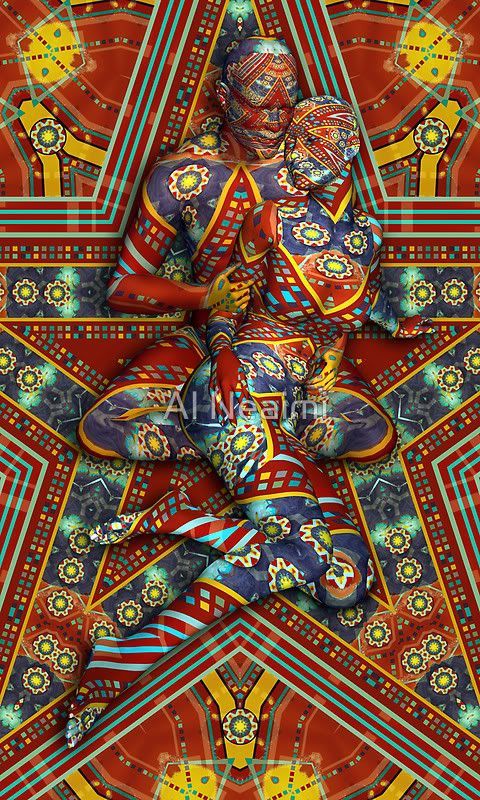
There are a multitude of things in the daily life of a man that reduce and weaken his masculine energy while there’s an abundance of things that bring forth feminine energy. Some men are born with very strong masculine energy and are mostly unaffected by external conditions, while most men are affected quite strongly. The tantric approach looks at the man as vertical energy and the woman as horizontal energy. This is one of the many interpretations of the cross. The woman takes us further in earthly life and the man takes us higher. In ancient spiritual cultures the mans’ obligation was to be involved with spiritual practices and ascend the whole family through that, while the woman took care of earthly matters. Both roles were set and everyone knew their place. What could a masculine man be like in our modern world? I really like David Deida’s book “The Way of The Superior Man”. This book gives an excellent description in my opinion about what it means for a man to be in his rightful masculine energy. This book is well suited to be mandatory literature for each man. Here I will describe my own understanding of what as a woman recognise to be masculine and what I’ve learned and noticed throughout my years in Tantra. Estonians have a nice expression: “Man by the word, bull by the horn.” A masculine man keeps his word and goes about it correctly. A masculine man does not use words to damage or undermine others and neither does he back down from what he has said. Throwing words just to impress is not his nature. He is always honest both to himself and others. A masculine man is always precise and correct about time. He never lets anyone wait for him and respects both his own time and of others. Treating others with respect is in his nature as well as being kind to everyone. He is respectful towards life as well. A masculine man knows that to be successful one needs to take care of both their internal and external worlds: mind and body. He understands his position as a giver by nature. A masculine man gives without conditions and understands that by giving he gets back the most. He respects, values, loves and admires women. In a relationship he creates for her woman an environment where she feels secure and loved, a place where the woman can create and let her greatest values bloom. A masculine man is attentive and knows what makes his woman’s soul sing and heart open. He is always present: while conversing, making love or otherwise spending time. Caring for his woman pleases him. A masculine man doesn’t run away from obligations, children or family, but rather dedicates time to them. He knows that feminine energy is one of his life’s greatest values and thus he never takes his partner for granted. His woman’s opinion is important to him, which doesn’t mean that he does exactly as the woman wants but that he is open to the woman’s opinions while making a decision. A masculine man never lets his woman manipulate him and always makes his decisions from love not fear. A masculine man takes responsibility in all the fields in his life. He never puts that responsibility on anyone else but himself. A masculine man knows how to be strong and powerful through his heart – he dares to speak about his feelings and cry when he feels like crying. A woman’s emotions do not scare him, he does not try to suppress them, does not judge them nor run away. He understands that emotions are a part of a woman. A masculine man does not let a woman’s emotions take hold of him and turn him petty. ~Katrin Silman
#katrin silman#masculinity#femininity#tantra#sacred sexuality#sacred relationships#higher awakening#higher consciousness
21 notes
·
View notes
Text
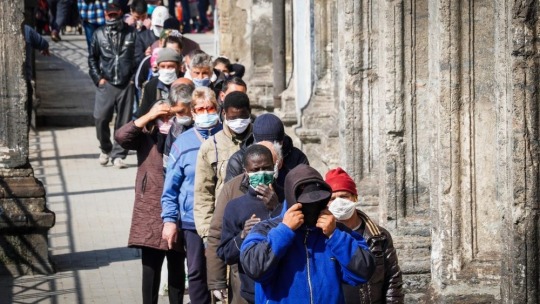
13th April >> (@VaticanNews) #PopeFrancis #Pope Francis calls for consideration of ‘universal basic wage’ for unprotected workers.
Pope Francis writes a letter to Popular Movements and community organizations on the front lines of the coronavirus pandemic response, calling for the consideration of a possible “Universal Basic Wage”.
By Vatican News
In a letter dated Easter Sunday, 12 April 2020, amid the Covid-19 pandemic, Pope Francis has called for the consideration of a Universal Basic Wage “that would ensure and concretely achieve the ideal, at once so human and so Christian, of no worker without rights.”
The letter is addressed to World Popular Movements, some of whom he recollects meeting with when in Bolivia during an Apostolic Visit in 2015 and in the Vatican the following year.
“Now, in the midst of this pandemic, I think of you in a special way and wish to express my closeness to you,” he writes.
The Pope’s message comes at a time in which the pandemic is devastating the health and lives of so many, and consequently putting millions of jobs on the line and undermining local – and world – economies. In it, he expresses encouragement and solidarity with those Movements who aim to bring change to global systems and structures that exclude a multitude of workers.
In these days of great anxiety and hardship, the Pope notes, “you are truly an invisible army, fighting in the most dangerous trenches; an army whose only weapons are solidarity, hope, and community spirit, all revitalizing at a time when no one can save themselves alone.”
He took the opportunity to thank the Popular Movements for the work they pursue. He acknowledges that work hardly ever receives the recognition it deserves, Pope Francis notes “You do not resign yourselves to complaining: you roll up your sleeves and keep working for your families, your communities, and the common good. Your resilience helps me, challenges me, and teaches me a great deal.”
A multitude of people suffering far from the limelight
He goes on to mention all those people suffering far from the eyes of the world:
The women, “who multiply loaves of bread in soup kitchens: two onions and a package of rice make up a delicious stew for hundreds of children.”
The sick and the elderly, “they never appear in the news,” he says, “nor do small farmers and their families who work hard to produce healthy food without destroying nature, without hoarding, without exploiting people’s needs.”
“I want you to know that our Heavenly Father watches over you, values you, appreciates you, and supports you in your commitment,”, the Pope writes.
He highlights how difficult it is for those who live in poverty and for the homeless “to stay at home.” In addition, he mentions the difficulty “for migrants, those who are deprived of freedom, and those in rehabilitation from an addiction.”
People, life and dignity at the centre
Again, thanking the Popular Movements for being there to help them make things less difficult and less painful, the Pope expresses his hope this may prove to be a moment of change.
“My hope is that governments understand that technocratic paradigms (whether state-centred or market-driven) are not enough to address this crisis or the other great problems affecting humankind. Now more than ever, persons, communities and peoples must be put at the centre, united to heal, to care and to share,” the Pope writes.
He underscores how such a multitude of persons have been excluded from the benefits of globalization. They, he said, have been hit twice as hard from the harms produced by a society marked by the “superficial pleasures that anaesthetize so many consciences.”
“Street vendors, recyclers, carnival workers, small farmers, construction workers, seamstresses, the different kinds of caregivers: you who are informal, working on your own or in the grassroots economy, you have no steady income to get you through this hard time … and the lockdowns are becoming unbearable. This may be the time to consider a universal basic wage which would acknowledge and dignify the noble, essential tasks you carry out. It would ensure and concretely achieve the ideal, at once so human and so Christian, of no worker without rights,” says Pope Francis.
The three Ts
He goes on to point to the need to reflect on “life after the pandemic”. Its grave consequences are already being felt. This calls for an integral human development that is based on “the central role and initiative of the people in all their diversity, as well as on universal access to those three Ts that you defend: Trabajo (work), Techo (housing), and Tierra (land and food).
The Pope concludes with the hope that our sleepy consciences will be shaken, giving way to a “humanist and ecological conversion that puts an end to the idolatry of money and places human life and dignity at the centre.”
“Our civilization — so competitive, so individualistic, with its frenetic rhythms of production and consumption, its extravagant luxuries, its disproportionate profits for just a few — needs to downshift, take stock, and renew itself”, he says.
Finally, Pope Francis encourages the Popular Movements to stand firm in their struggle, caring for each other as brothers and sisters. He then assures them of his prayers and blessings.
POPE FRANCIS
Topics
WORK
SOLIDARITY
CORONAVIRUS
13th April 2020, 11:20
2 notes
·
View notes
Photo

“Chalk One Up” | Directed by Seith Mann, Cinematography by David Klein
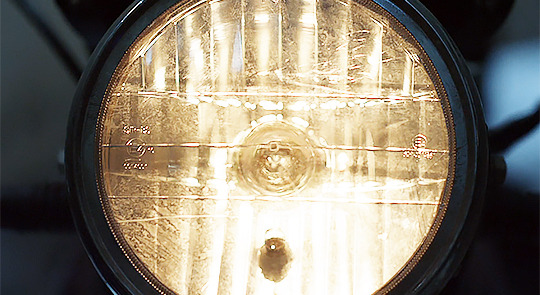
The episode opens with Carrie arriving from a long night out doing… God knows what with God knows who. We love the starkness of this close-up on the exterminated motorcycle light. According to Lesli Linka Glatter, this mode of transport is based on a real life story:
“The scene where she gets out of the embassy was based on the real agent who Carrie is based on. She was based in Iraq at the time and that’s how she got out: by dressing as a man and traveling on a motorcycle. So, we used that for this. Also, you can’t leave in Kabul without an armored vehicle.”
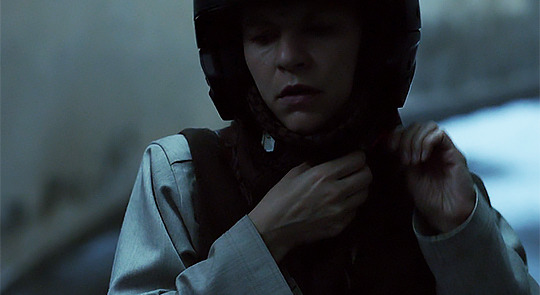
...as the camera slowly pans up to reveal it’s Carrie underneath that (gigantor) motorcycle helmet, the question becomes clear: where the fuck was she?
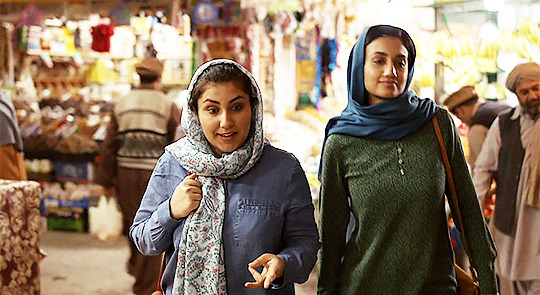
Sara loved these scenes between Samira and her friend. Homeland has depicted several cities in the Middle East over the years but has rarely given us glimpses into the world outside the walls of a hotel or CIA station, especially without our main characters. The market that Samira and her friend walk through is vibrant and filled with color, as are their outfits. It’s a stark contrast to the interiors of the CIA station. And Samira’s line that the Taliban didn’t go away but were no longer hiding proves remarkably predictive of the rest of the episode’s events.
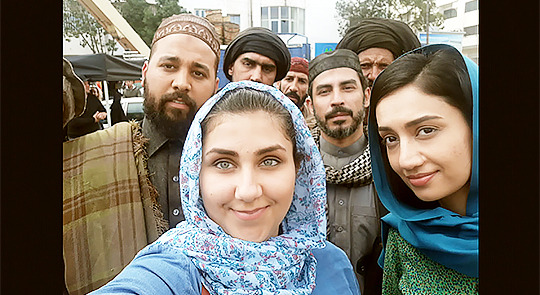
The real highlight of the scene is the selfie, of course. We love the detail of the man on the far, far left being cut out. Samira’s friend is the master of the one-arm selfie!
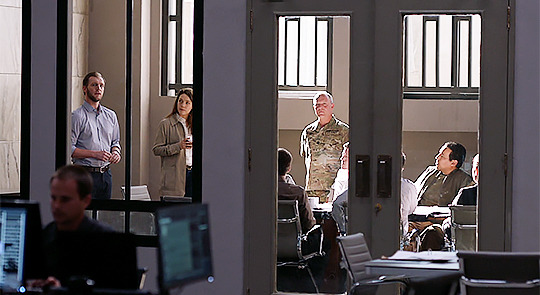
This shot of the various players at the Kabul station looking outward at Carrie is striking. It’s almost a reverse fish bowl. Carrie remains on the outside but everyone’s looks are in her direction. Jenna standing at the front of the room further suggests she was never “stuck in the starting gate.” She’s in the same position of power in that room as the Chief of Station and the commanding military officer at right. From afar, the dynamics are almost similar to early season one, Carrie running an ops meeting with Saul by her side. All of which is to say… is Jenna the Carrie to Mike’s Saul?
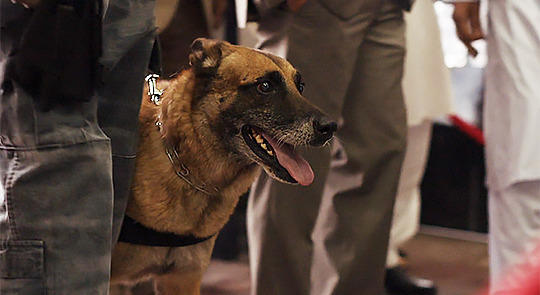
Dog.
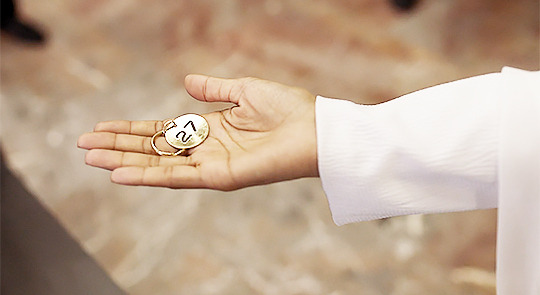
This was such a specific detail that we thought it required pointing out, but 27 is not a significant number on this show (at least that we can remember), so we’re not sure why they bothered to show this.
...unless it’s a reference to the general ominousness of the 27 Club and a hint that Carrie (who, to be fair, is far past the age of 27) is going to die.
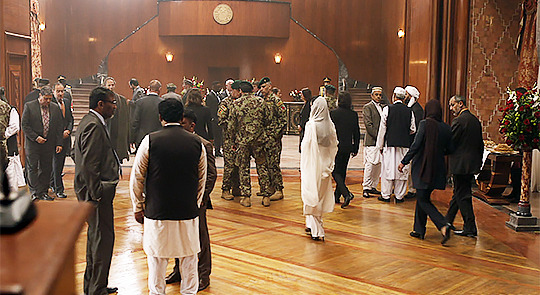
This week the show confirmed that Tasneem is the Director of the ISI. Which means that (after President Elizabeth Keane) she’s the second most powerful woman ever depicted on this show. And boy does she dress the part!
Tasneem’s all-white ensemble is attention-grabbing and distinctive (the other women in this frame are dressed in dark clothes). It’s also visually similar--especially with her long, black hair peeking through the sheer fabric of her headscarf--to the dress worn by several other men at the reception.
Homeland has told lots of stories over the years--whether intentional or otherwise--about the challenges women face living in a patriarchal, misogynist society. Whether it’s Martha losing her career because her loser husband couldn’t stand having a wife who was more powerful and smarter than he…. Or Allison dying in the back of a car near the Russian border in an act of scorned lover revenge. Or Carrie, screaming and crying at the end of “The Vest”... but being right the whole time.
Or, as Abigail Nussbaum said more elegantly than we ever could:
“Carrie is, in many ways, a boogeyman; she is what professional women, and particularly ones in male-dominated professions, have been taught never to become - emotional, hysterical, crazy. Emotion is how women who want to be taken seriously are undermined and dismissed. Even if you’re perfectly sane, being emotional - and most especially, being angry - devalues you and your professional contribution. A woman can be called crazy simply for behaving like a normal human being rather than a robot (and of course, if she behaves robotically and unemotionally, she’s a cold bitch). But Carrie isn’t simply emotional (though she is that too, and worst of all, she allows her feelings for a man to cloud her judgment) - she actually is crazy and hysterical, in the proper clinical sense rather than the exaggerated one which attaches to any feminine display of emotion, and profoundly pathetic and unattractive in that state. And she’s completely right, the only person who figures out Brody and Abu Nazir’s plans and motivations, and the person who saves the day by being hysterical, infecting Brody’s daughter with enough of that hysteria that she calls her father and convinces him not to blow himself up.
It’s certainly possible to read this arc as purely tragic, Carrie’s self-destruction being the cost of saving the world (though this is a character arc that is applied to men as often as women, for example in Thomas Harris’s Red Dragon), but to my mind its effect is more complex. It makes a crazy, hysterical woman into a hero without in any way mitigating her craziness or hysteria, and thus defangs the argument that emotion in women is a weakness. It’s the rational, sane men around Carrie, who turn away from her unattractive mania with distaste and embarrassment, who are blind and incompetent, and it’s that same inability to look past surfaces that leads them to put their trust, wrongfully, in Brody - just as Carrie performs hysterical femininity, Brody performs stalwart masculinity. Both are misleading.”
All of which is to say, we’re really fucking pumped to see how Tasneem’s role expands for the rest of the season, and we think the array of women in Tasneem, Carrie, and Jenna and their varying degrees of power is going to be really interesting to see unfold.
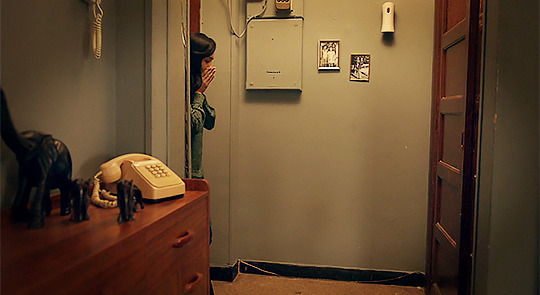
Sara is obsessed with this shot. She’s obsessed with the set design of Samira’s apartment. She’s obsessed with this moody lighting. She’s basically just obsessed.
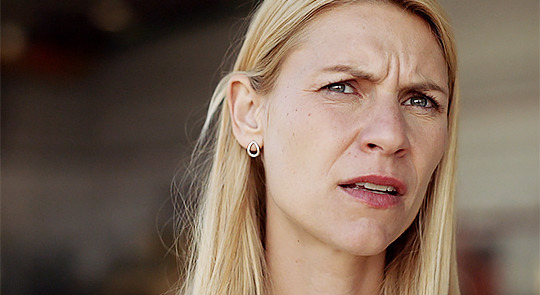
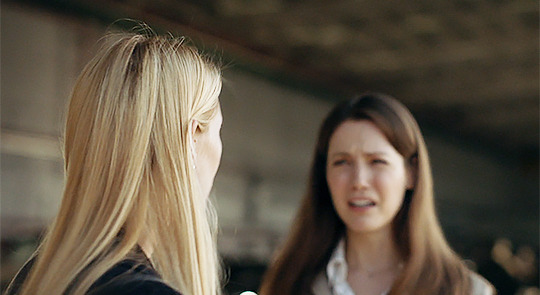
Last week we had a slow pan around Jalal to reveal Tasneem. This week we have a similar slow pan around Carrie to reveal Jenna. This definitely means that Sara’s theory that Jenna will “single white female” Carrie is right on track.
Also, Gail hereby declares Carrie’s delicate silver jewelry her “FULL circle earrings,” because everything is coming full circle this episode, including accessories.

That said, we can’t deny the power of this shot. First, we have to note what’s going on in the background (which is actually in focus). President Beau has just arrived off Air Force One and immediately stops for a photo op with the Afghan president. From the beginning, the show is clear this is an optics-based trip.
But we really love this image of Carrie and Jenna (out of focus, but in the foreground) side by side. Again, they mirror each other, but in opposite ways (“So they’re mirror opposites?” --Sara’s brain). Carrie’s light hair versus Jenna’s dark hair. Jenna’s light jacket versus Carrie’s dark one. It’s eerie.
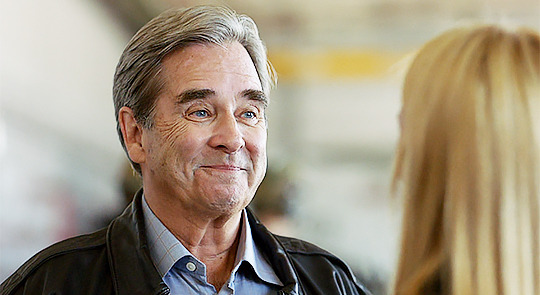
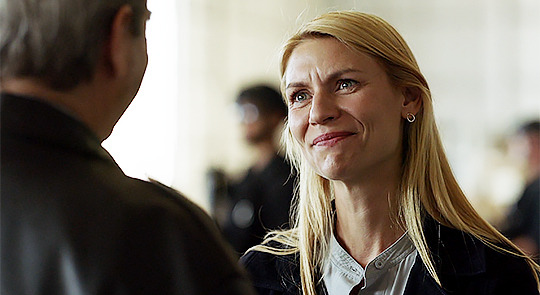
On the podcast we talked at length about the scene between Beau and Carrie. It’s genuinely moving. The staging of it is unique as well. The camera shoots them both at the same height. They stand close together. Ironically, the power dynamic seems almost equal. He’s one of the few people who’s ever acknowledged the sacrifices she’s made in service of her country.
Their twin smiles here are all the more tragic following the sequence of events that closes the episode. They all sincerely want peace. So many characters smile real, genuine smiles this week. That’s not a normal Homeland occurrence!
And they all legitimately believe in what they’re doing. They believe they’re doing the right thing. Maybe they are. But partly out of necessity, and partly out of more selfish desires (Hayes later says it’s all about getting a second term), they get caught up in the theater of it all. They make poor decisions. They take the wrong risks.
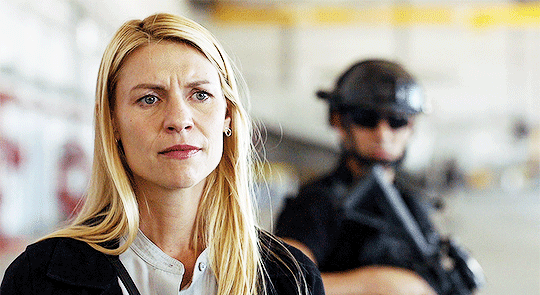
Every so often in this series we have to abandon screenshots in favor of gifs in order to truly capture ~the moment~ and this is one of those times! The way Claire plays Carrie’s reaction here is so specific, so nuanced and strange and wonderful. These “lived in” moments are something we’ll really miss when the show is over.

IJLTP.
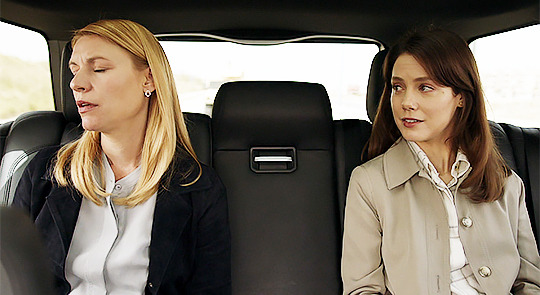
We’ve all been there, Carrie.
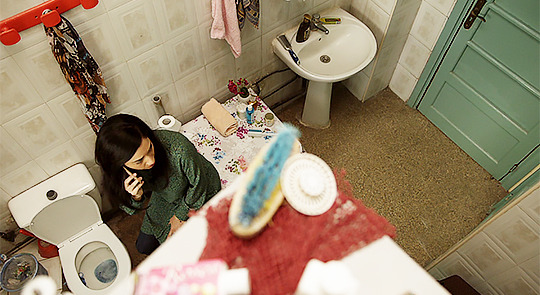
This is another interesting shot choice. We’re not sure what its purpose is, other than to add interest to a fairly run-of-the-mill scene. But still, the set design! *heart eyes*
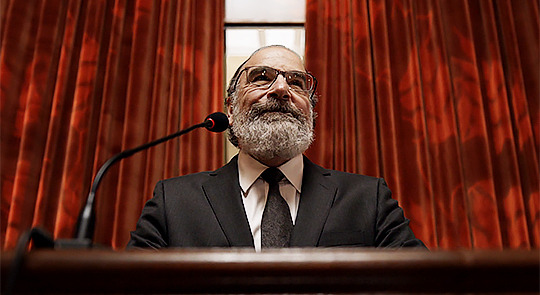
Sara’s note for this shot was “Saul is so extra.” We talked about genuine and sincere smiles above and Saul’s here does qualify… sort of. This is halfway between genuine and self-aggrandizing. AKA “where Saul lives 100% of the time.” He looks like a director about to screen his short film at Sundance. The red curtains parting slowly behind him are Too Much.
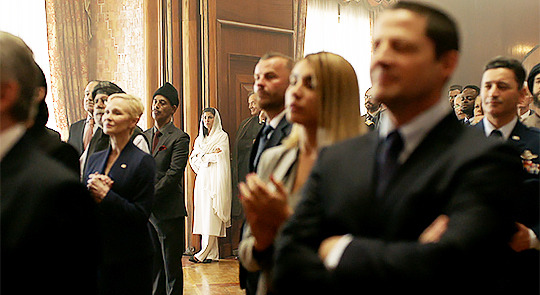
Tasneem and G’ulom are the kids in the back of the classroom who are so fucking done with this shit but can’t leave because they’ll get detention. We will continue to stan.
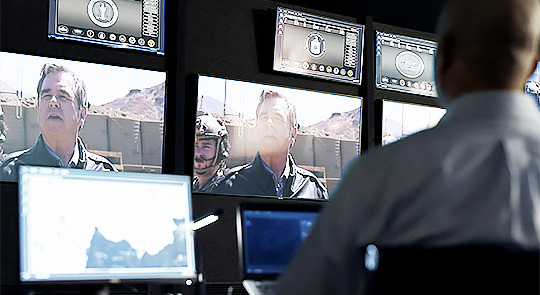
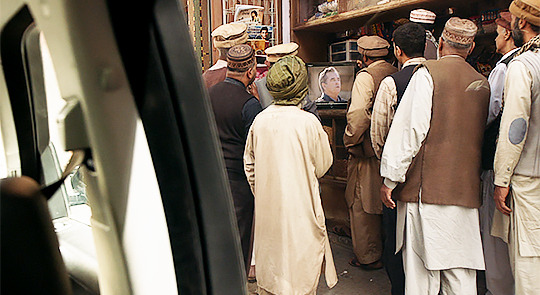
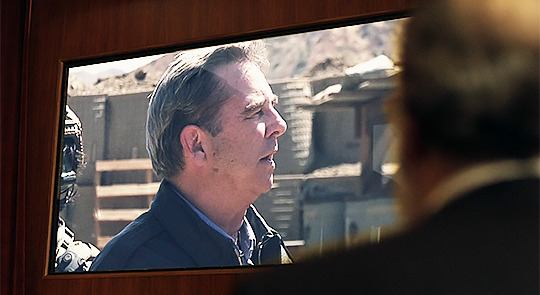
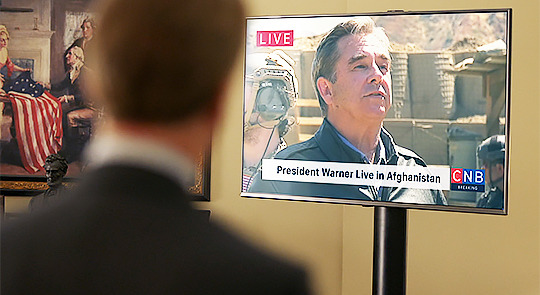
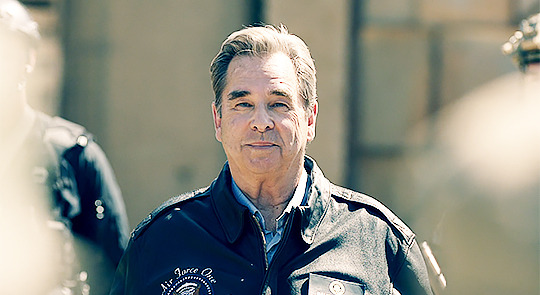
It’s a classic Homeland device to show a significant moment from a variety of perspectives, especially if those perspectives involve screens. The multitude of angles on Beau’s speech here reminded us a lot of Keane’s resignation speech in the Oval Office in “Paean to the People.” Coincidentally, that was her last hurrah as president too.
(P.S. Another Saul over-the-shoulder shot!)
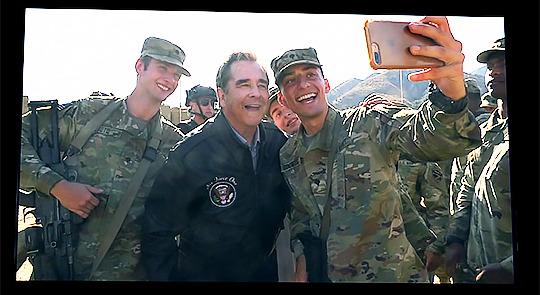
Two selfies in one episode!
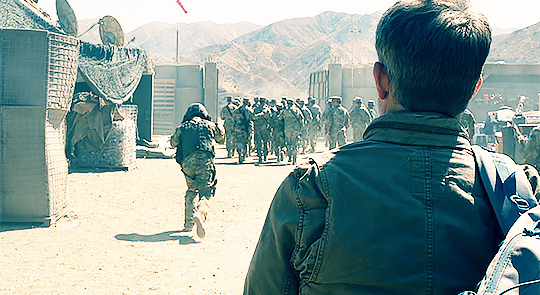
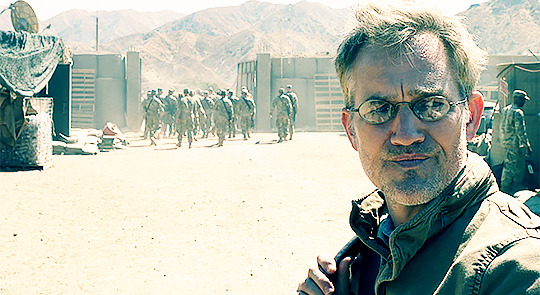
We loved the payoff to Max’s subplot. For once this season the weird LA filter actually looks nice! These are beautiful shots and the reflection in Max’s glasses is especially striking.
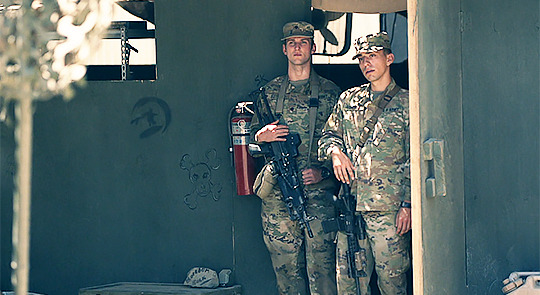
The skull and crossbones on the barracks is an ominious detail. As is the rock labeled “Boredom Rock.” Death and boredom really have been the two extremes of Max’s stint at the combat outpost.

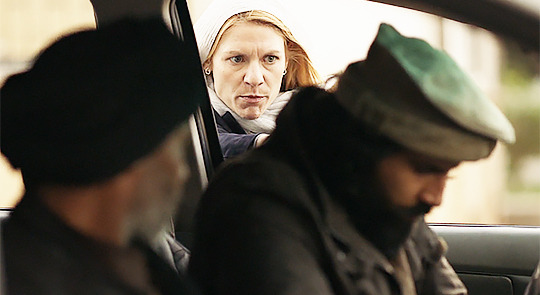
We’re still divided on the merits of the “Carrie has to save Samira” storyline, but the camerawork here, with Carrie’s armed hands appearing out of nowhere, was pretty cool.
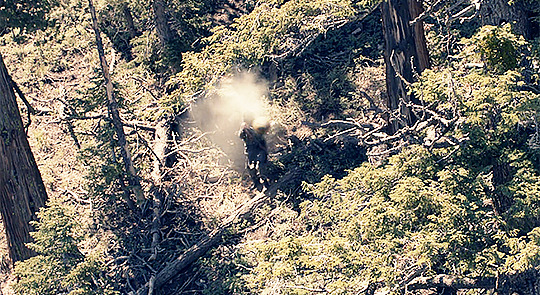
This RPG shot was one of the cooler special effects the show has done in a while. The entire sequence of Chalk One looking for Chalk Two was tense and thrilling and extremely well-executed.

Bringing us back to the ops room, the “LOSS OF SIGNAL” projected now for both helicopters is pretty chilling.
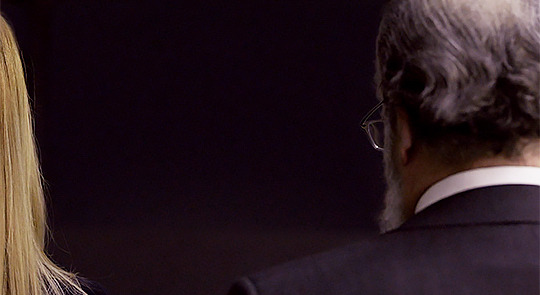
This is now Sara’s favorite shot of the entire series and we’d be remiss if we didn’t mention that it’s another over-the-shoulder Saul shot. This time he observes one of the crowning achievements of his long career literally blowing up in his face.
Visually, this shot anchors the viewer back to the Carrie/Saul relationship, the central one of the show. The black blankness--and the failure it represents--engulfs the frame.
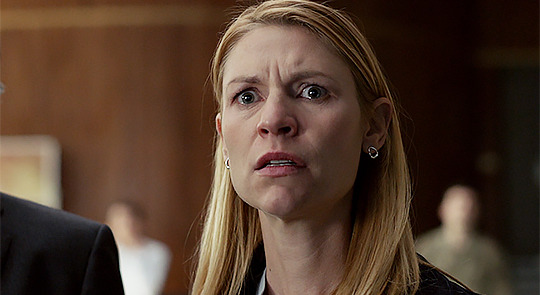
We love the choice to end the episode on Carrie alone. It refocuses the event back to her. The horror in her eyes, welling up with tears, is palpable. How does Carrie feel? Alex Gansa explained that the writers wanted to create a new 9/11 with this maybe-assassination of the president. And it’s a fitting bookend for the show in many ways. In Homeland’s pilot, Carrie says she “missed something that day,” misdirecting blame to herself for not preventing 9/11. Now, in the final season, the show seems poised to tell a story in which Carrie is blamed for the “new 9/11.”
Strap in, folks. It’s gonna be a rough ride.
2 notes
·
View notes
Note
does it bother you that It utilizes the bury your gays trope?
hi! thanks for asking this, because you’ve given me the opportunity to do my favorite thing in the world, which is analyze my favorite media
short answer: a little, but not really
long answer, under the cut. please keep in mind that this is just MY interpretation and if you WERE bothered or hurt by the portrayal of gay people in the IT movies i’m not saying you’re wrong, you’re perfectly within your rights to feel that way and i get where you’re coming from. remember that this is just, like, my opinion, man
so firstly i want to say that i’m not a book purist by any means, films and books are different mediums and changes have to be made to make a book work as a movie, so i don’t get too ruffled by changes, but one thing i’ve never liked is when a film version changes who lives or dies. i’ve never liked that Haldir dies in the LOTR movies and i refuse to see the film version of My Sister’s Keeper because they changed which sister dies in the end, thereby changing the meaning of the ENTIRE STORY. so….i don’t like when movies change which character dies. i think someone needs to die in that scene in IT, and i actually think (you’re free to disagree) that that is a solid conclusion for eddie’s story arc. the only other character it could make sense to kill off at that point in the story is MAYBE bill, and that just wasn’t gonna happen
anyway, my next point is that whether or not this was the right decision (and i don’t think it was fwiw) eddie isn’t canonically gay in any version of this story. richie is, in It Ch2, but eddie is still left up to interpretation. it’s hard for me to view a version of this story where i DON’T interpret eddie as gay, but the fact remains that the subtext in the novel was unintentional by Stephen King, and Andy Muschietti chose, in the films, to leave it ambiguous. like i said, it’s pretty clear TO ME that eddie is gay, but many, many people have read It and had different interpretations. so on that note i’m not even sure this QUALIFIES as bury your gays.
i do think eddie is the most blatantly queer-coded character in the book, fwiw, for a multitude of reasons. i’m surprised richie is the character they chose to make Canonically Gay - though i wonder if it’s bc richie would feel less stereotypical?
like….do i WISH richie and eddie could be together? yeah, i do! at the same time, though, i see a lot of people thumping on about how richie is the only character to get an unhappy ending and i have a lot of problems with that. i mean, are we gonna pretend the rest of the losers didn’t love eddie?? bullshit. they did. they’re all grieving for him, and for stan, who’s still dead btw people seem to forget about that?
i think people tie richie’s eventual happiness too much to eddie. it’s true that richie’s adult life has been largely unhappy, but his childhood wasn’t. he dealt with bullying, yes, he dealt with a killer clown, but of the Losers, he and stan probably had the happiest home lives. (in the book i think richie’s dad is like, a nice dentist or something like that.) i think people are undermining the amount of happiness truly accepting oneself can bring, and richie has reached that point by the end of It Ch2. and then i hear people complaining that richie can never find happiness now because eddie, his soulmate, is dead? to which i say….let’s be realistic here. again, i wish eddie and richie could be together but to say that a 40-year-old man’s soulmate is the person he had a crush on when he was 13, and the only way he can be happy is if he can be with him….i think that’s not only unrealistic but also damaging. there’s a whole world out there, kids, and it’s not going to end if you don’t get to marry your first crush. richie will be okay - and hell, eddie would be FURIOUS with him if he put his whole life on hold just because he’s dead.
i’ve also seen arguments that richie would just be depressed and want to die after the events of It Ch2, including and mostly because of eddie’s death, and i just don’t think that’s true either. i think right after eddie died there’s probably a moment in richie’s head that’s like “oh my god i wanna die i wanna lie down right here and die with him” but, like, fleeting. richie’s entire THING is how badly he wants to live. his fight with bill in the first movie is because bill keeps putting the Losers in danger and richie is like FUCK YOU BILL I DON’T WANNA DIE. he tries to leave derry in ch2 because this is too dangerous and he doesn’t want to die. richie simply does not want to die. i would feel FAR more cheated and wronged if richie died than eddie.
which, btw, brings me to why i think eddie’s death was an adequate way to end his arc which i know is probably the MOST controversial thing i would ever say so skip this paragraph if you don’t wanna hear about that. it’s not that i’m not sad that eddie dies, i AM, it’s TERRIBLY sad, but all the same, didn’t eddie have a terribly sad life? he grew up under the thumb of this overbearing mother who convinced him he was weak and sickly, and grew up to marry a woman much like her. (btw - based on the book i don’t think eddie’s wife myra is actually the awful abuser a lot of people portray her as, though the movie’s portrayal contributes to that. i think myra is a very anxious, needy woman who married a man who made those traits worse, whose own anxious and hypochondriac tendencies were worsened by being married to her. they’re just very very wrong for each other and that doesn’t make myra a villain.) i think eddie’s ending was him finally proving to himself just how brave he really is, that he’s not weak or too sensitive, or any of the things he’s always been told he is. eddie dies a hero’s death and for his character, for his arc, that’s fitting. in the book, he’s not even particularly upset. Not bad, he would begin. This is not bad at all (King 1086). i don’t mean to say there was no hope for eddie. not at all. he could have lived, he could have gotten out of his marriage and channeled his newfound courage and bravery into living a new life….but if he has to die, and i think someone should in this story, that’s the way to go. hero.
on the whole, i thought what IT Ch2 did in terms of sexuality was….really great. anybody who follows me knows that horror is my favorite genre, but i have always understood that it’s not a genre that is particularly friendly towards any marginalized group, whether that’s by race, gender, or sexuality. i felt SEEN by It Ch2, and i felt like these stories mattered to the filmmakers. at the end of the day, richie lived, and he’s going to KEEP ON living, and that’s important
5 notes
·
View notes
Text
[T]he tradition [...] has been to consider friends in terms of reciprocity, equality, and resemblance [...]. [I]n other words [...] people like us, another self. [...] [W]hich would seem [...] to undermine [...] that we might consider ourselves (or some of us at least) as friends of trees, [...] bees, butteflies, or bacteria. [...] And although we might [...] be slightly wary of generalizing too far or too quickly from the specifics of the relationship between a human and a nonhuman with a fairly obvious ethical ‘face’ [...] what [we] consider, then, is whether friendship might be better characterized not by the sorts of entities it links but, rather, by a certain quality of being open to and with others. Although we cannot ‘speak’ with nonhumans in any straightforward way, what we can and more importantly do do is become articulate with them in various ways. ‘Societies of friends’ collectively exhibit, in other words, both the willingness and the capacity to ‘learn to be affected’ [...] as [...] the process of how our bodies are “‘effectuated’, moved, put into motion by other entities, human or nonhuman [...].” [O]ur amateur entomologists [can] learn to be affected by Monarchs such that they can [...] with knowledge of the butterfly’s navigational cues, have some chance of following their travels from the ground. What we are left with after all this [...] looks less like inconsequential and asocial activities and more like ‘communities of practice’ [...]. But even if we collectively remembered these fragmentary nonhuman biographies, would that be enough to make a difference? [...]
What does it mean [...] that we seem to be willing potentially to sacrifice [...] lifeforms like bees, butterflies, and bacteria for the march of human progress? If there is a way out of this historical impasse, it is not to be found [for some] in attributing some of ‘our’ qualities to ‘them’. It “would not be a matter of ‘giving speech back’ to animals [...]. Although a certain tradition of binary thought is still “prevalent”, it has always been best “resisted” by the simple fact “that there is a multiplicity of living beings, a multiplicity of animals, some of which do not fall within what this grand dis/course on the Animal claims to attribute to them [...].”
Perhaps the task is not to seek to compare the dance language of bees [...] with human language, the ‘intelligence’ [...] of Monarch butterflies with human intelligence, [...] but rather (or at least in addition) to find a way of thinking about these ‘remarkable things’ that grants them positive ontological difference in their own right. [...] Nancy works [...] to [...] reformulate it such that primacy is given not to ‘being’ but, rather, to ‘being-with’. Or, as he puts it, “Being cannot be anything but being-with-one-another [...].”
[It] is concerned with what is always a multitude of others rather than a singular other [...]; and it is radically nonanthropocentric [...]. Even as we establish ‘how many are we?’, [...] we [...] also [ask]: ‘can we live together?’ [...] The unique [global] migration of the Monarch butterfly, the endless round trips of the honey bee, the slow, slow action of a soil microorganism [...], all these lifeform-narrative-trajectory-things [...] by which the world “appears each time [...].“
The world as theorised here, then, does not begin and end with ‘us’ but, as Devisch explains, originates and is (re)created all over the place:
“That there is something means that the world comes into being. The ‘origin’ of the world takes place always and everywhere, time and time again, in every singular act of no matter which being, always momentous and local. World is thus always a multitude of worlds, an endless ‘passage’ of phenomena [...].”
---
All text above by: Nick Bingham. “Bees, butterflies, and bacteria: biotechnology and the politics of nonhuman friendship.” Environment and Planning. 2006. [Some paragraph breaks/contractions added by me.]
#ecology#landscape#abolition#multispecies#interspecies#geographic imaginaries#tidalectics#archipelagic thinking#insects#ecologies
226 notes
·
View notes
Text
Wrath Month: Probably Not Gonna Calm Down
I feel very frustrated by @taylorswift’s “You Need to Calm Down” (currently “#3 On Trending” on youtube). This is not a particularly hot take.
Corporate pride tends to be highly contested in general: on the one hand, some argue that it's helpful to LGBT+ youth to see themselves represented in the hegemony and suggest that maybe it’s better that corporations are courting LGBT+ dollars over the money of homophobes; on the other, normalization (especially normalization through capitalist/corporate interests) has historically been complicit in the further marginalization of many queer folks--especially trans women of color. To some, “You Need to Calm Down” is simply one example of corporate pride, and therefore represents the same potential for an ambiguous reading. Personally, I have tried to imagine whether this song would have meant anything useful to me as a closeted queer teen; I remember looking desperately for queer themes in “straight” music, and I remember being slightly older (18, maybe?) watching Hayley Kiyoko’s “Girls like Girls” on a loop and how much my first exposure to actually queer music produced by actually queer artists meant to me, and I don’t think even that version of me would have felt connected to Taylor Swift’s attempt to reconcile her experience as a celebrity who has literally capitalized off of internet drama to the harassment queer folks experience daily for existing as themselves.
The Onion’s article “Taylor Swift Inspires Teen To Come Out As Straight Woman Needing To Be At Center Of Gay Rights Narrative” does a great job of simplifying why exactly this video and song is so exhausting to me and many other LGBTQ+ folks: the author argues that Taylor Swift uses “LGBTQ iconography to advance her career” and that, rather than letting people speak for themselves and control their own narratives, she’s making Pride Month about herself. The Atlantic and Vox both have run more in-depth articles breaking down the multitude of reasons why this song is deservedly coming under fire, which I highly recommend reading.
One counter argument I’ve seen here and there is that Taylor Swift is actually not a straight woman centering a gay rights narrative around herself--now that she’s said the word “gay” in a non-negative way in a song, its only a matter of time before she comes out! So one of the things I want to emphasize here is that while I personally don’t believe she’s queer (and per Swift’s own tumblr post explaining why she didn’t kiss Katy Perry in the music video where she says “To be an ally is to understand the difference between advocating and baiting. Anyone trying to twist this positivity into something it isn’t needs to calm down. It costs zero dollars to not step on our gowns.” she doesn’t seem to anticipate coming out either), regardless of whether or not she turns out not to be straight, this song and its lyrics are appropriating LGBTQ iconography to advance her career, and Swift is using queer folks as accessories to perform “wokeness” and draw parallels between herself and actual marginalized communities for her own gain. She may end the music video with directions to sign her petition for Senate support of the Equality Act, but the links in the song description are all promotion for her song, her merch, and her social media accounts. She does not even follow through on the optics of social justice.
The main way I want to trace this argument is through her fundamental misunderstanding and, more significantly, misrepresentation of what homophobia is.Throughout the song/music video Swift is consistently trying to render compatible her own supposed experiences with being bullied/criticized on the internet to the violence of homophobia which is, quite frankly, fucking wild. She sings: “Say it in the street, that's a knock-out / But you say it in a Tweet, that's a cop-out.” What seems to be the intended interpretation of this line is that negative interactions online are cowardly, because people are “hiding” behind usernames and icons, rather than being “brave” enough to offer direct criticism and publicly/visibly own their words; I am not going to go into the potentials of this line of conversation, because I do think in another context (and said by other people) real conversations about the potentials and pitfalls of online culture in regards to purity/call-out culture, social activism/organizing, and bullying can be and are already being had. What I want to point out here is the cognitive dissonance: who can say anything in the street to someone as rich, privileged, and insulated as Taylor Swift? If Swift only accepts criticism delivered in person, she doesn’t accept criticism and she might as well own up to that. And when she is trying to tie this into a commentary on homophobia, maybe she should have considered for two seconds the kind of actual danger queer folks (especially trans and gender non-conforming) are actually in on the streets every day while she’s in a mansion/penthouse apartment (and to that extent, the gentrified trailer park imagery didn’t sit to well with me either, but I’ll get into the discussion of class later on). Queer folks really are getting knocked-out in the streets (1, 2, 3). Furthermore, in her desperate attempt to center her psuedo-discourse on homophobia and queer liberation around herself, she sings the lines: “But I've learned a lesson that stressin' and obsessin' / 'bout somebody else is no fun / And snakes and stones never broke my bones”. I’m not really surprised that it doesn’t “break her bones,” given how successfully she has marketed and monetized her feuds and her own victimhood; this is just a newnother rebranding of said victimized persona, and even though she may not be bothered, there are real stakes to it beyond the “lack of fun”.
So let’s get into it. As I said before, Swift is dangerously misrepresenting what homophobia is and what it looks like, namely through the use of a progress “wrong side of history” narrative. The lines run “Why are you mad when you could be GLAAD?...Sunshine on the street at the parade / But you would rather be in the dark ages” and the music video shows what Kornhaber, writing for The Atlantic, aptly describes as “an unwashed-looking mob” holding childish signs with misspellings and the all-time classic “Adam + Eve Not Adam + Steve.” Korhnaber points out the more common use of “God Hates Fags” signs; personally, I’ve also seen a lot of the “HolyBible” “After Death, the Judgement” signs. In Swift’s narrative, homophobia looks like the obvious, regressive, primitive villain; the already defeated. Perhaps worse, it looks like the rural poor, against the backdrop of rich queer celebrities. This narrative works to render invisible the poor-and-queer, and it undermines the real dangers homophobic violence poses by imagining homophobia has already lost. Imagining homophobia as thirteen unwashed rural poor people who can’t spell the word “moron” obscures the reality that there are also the Mike Pences and the Philip Anschutzs and the laundry list of other rich and connected anti-LGBT politicians, activists, and donors who have very real effects on the lives of the disabled, people of color, women, LGBTQ+ folks, the poor, immigrants, and all the intersections thereof. This also ties into the way Swift puts forward the solution “You just need to take several seats and then try to restore the peace / And control your urges to scream about all the people you hate.” As meaningless as these lines are overall, the insinuation that there is a “peace” that we can be “restored” to that would benefit the marginalized and oppressed is ridiculous and harmful, and again misrepresents the problem. Moreover, it suggests the problem could be understood as one of bodily discipline: if homophobes “controlled” themselves better, didn’t scream so much, there wouldn’t be a problem--this gets us back to the problematics of representing homophobia as exclusively the undisciplined poor, rather than the rich and connected. It also leaves room for the potential insinuation that everybody who is angry on the internet needs to calm down; I’ve seen a lot of jokes that this Pride Month, the 50th anniversary of Stonewall, we’re returning to our rebel roots and also celebrating Wrath. I certainly don’t plan to calm down, thanks anyway, Taylor.
In this same vein lets consider the much quoted line: “'Cause shade never made anybody less gay”. This was the first line I heard from the song, and my immediate problem with it was, as Korhnaber also points out, that throwing shade comes from queer communities of color, and “there are many ways to describe a parent who disowns a trans kid, or a lawmaker who tries to nullify same-sex marriages, or a church member who crashes a gay soldier’s funeral. Shady isn’t one.”
Swift hides from potential criticism/backlash behind a psuedo-feminist “female solidarity” with lines such as: “And we see you over there on the internet / Comparing all the girls who are killing it / But we figured you out / We all know now we all got crowns.” While there certainly are people who try to pit women against each other on the internet, again this is something which Taylor Swift has directly utilized multiple times to make herself money. I’m glad celebrities know they’ve all got crowns, but in what world does this benefit the non-rich and famous?
#taylor swift#queer theory#pride month#homonormativity#heteronormativity#homophobia#slurs cw#essay#maybe i can't say it in the street but taylor if you or your publicity team wanna respond heres an open invitation#bc FOR REAL they dont even put a link to the petition in the description which is WILD like if ur gonna go for the optics of wokeness#at least follow through that much lmao#anyways as always i wrote this in a 2 hour rant so ill fix typos as i catch them
12 notes
·
View notes
Text
ISLAM 101: ALMS AND CHARITY: VIRTUES OF ZAKAT: Part 3
ZAKAT (THE PRESCRIBED PURIFYING ALMS)
The second important duty of servanthood is zakat. God’s Messenger, who depicts prayer as Islam’s pillar or support, describes zakat as its bridge for zakat not only brings the social strata closer to each other and fills in the gaps between them and their members but also stops such gaps from forming.
Zakat means purity and growing. Since it purifies wealth and people’s attachment to it and causes both it and Muslims to grow in purity and sincerity, the Qur’an calls it zakat (or the prescribed alms):
(O Messenger,) take alms (prescribed or voluntary) out of their wealth so that you may cleanse them thereby and cause them to grow in purity and sincerity, and pray for them. Indeed your prayer is a source of comfort for them. God is All-Hearing, All-Knowing. (9:103)
Taking into account its very nature, zakat constitutes one of Islam’s five pillars. It is associated with prayer (salat) in 82 Qur’anic verses. God, the Exalted One, prescribed it in His Book (the Qur’an), His Messenger corroborated it by his sunnah, and the Muslim community by consensus upheld it. Ibn ‘Abbas reported that when the Prophet sent Mu’adh ibn Jabal to Yemen (as its governor), he said to him:
You are going to people who are People of the Book. Invite them to accept the shahada: that there is no deity but God and I am His Messenger. If they accept and affirm this, tell them that God, the Glorious One, has enjoined five prayers upon them during the day and night. If they accept that, tell them also that He has enjoined sadaqa (meaning zakat) upon their assets, which will be taken from the rich of the (Muslim) community and distributed to the poor. If they accept that, refrain from laying hands upon the best of their goods and fear the cry of the oppressed, for there is no barrier between God and it. (Bukhari, “Zakat,” 1:41; Muslim, “Iman,” 31.)
Many verses exhort Muslims to pay zakat and forbid hoarding wealth. For example:
The believers, both men, and women, they are guardians, confidants and helpers of one another. They enjoin and promote what is right and good and forbid and try to prevent evil. They establish the prayer in conformity with its conditions and pay the zakat (prescribed purifying alms) fully. They always obey God and His Messenger. Those are the distinguished ones whom God shall treat with mercy. Assuredly, God is the All-Honored with irresistible might, All-Wise. (9:71)
and:
Those who hoard gold and silver and do not spend it in God’s way (to exalt His cause and help the poor and needy: O Messenger,) give them the glad tidings of a painful chastisement. (9:34)
WHAT ARE THE BENEFITS OF ZAKAT FOR ITS RECIPIENT?
In addition to rescuing society from falling victim to poverty, zakat eliminates socially detrimental crimes like theft and robbery, as the common factor usually underlying these crimes is poverty in one way or another. Once the lack of faith, which deters from crime, is added to poverty, not much reason remains to prevent the perpetration of such crimes.
Through the promulgation of zakat, Islam seeks to extirpate, from the onset, social diseases like theft, by destroying their very foundation and preventing their establishment. By utilizing the privilege of performing zakat, the wealthy not only offer a righteous act of worship, but they also soothe the poor, providing them with financial relief and thus preventing them from taking up theft as a means of sustenance. In an interesting wise, the poor receive needed recognition in the community as people sought after by the rich to allow them to complete their obligations. This, in no way, should be conceived as freeloading, as this is something unthinkable for a healthy Muslim. Rather, zakat is financial help during a rainy day, in a sense, encouraging the recipient to take brand new steps. Condescending to freeloading off others, for a Muslim who possesses the power to make his own ends meet, is totally unacceptable in Islam, which praises work by holding it equal with worship. For a healthy Muslim, unemployment is only temporary, and zakat provides the much-needed spirit and catalyst during that transitional period until the recipient becomes a giver himself.
The Noble Prophet enumerates poverty that “makes one forget the Lord”39 among the seven things that must be avoided before their arrival. A person suffering in the throes of extreme poverty, along with many things, is bound to forget the purpose of creation. Such a ruinous thought must be avoided as it will only add to the person’s sufferings by causing additional anguish in the hereafter.
ZAKAT HELPS ACHIEVE WORKING POWER
Zakat is a source of power for the needy. In addition to providing the financially stricken poor with desperately needed capital, zakat also injects in them dynamic energy, instilling in them the confidence to provide for their own.
By hindering stockpiling, zakat bestows an intense vitality on the economy as well as ultimately providing matchless opportunities for the unemployed, winning them back to the community. Islam incessantly encourages individuals to be effervescently active, conversely condemning laziness and time-wasting.
Consequently, it is not difficult to imagine the enormity of the contributions to the overall economy brought by the person who is given such a great opportunity, as a result of the application of invaluable teaching.
The prevalently unfortunate state of young people in secular societies, who squander their time and precious potential in such places as pubs and casinos, reinforces the importance of zakat. A country whose non-contributing masses have been revivified through such a process whereby wealth is continuously cycled for the benefit of all will inevitably experience an economic revitalization.
ZAKAT PROMOTES EMPLOYMENT
Contrary to popular belief, zakat does not give rise to indolence; on the contrary, it encourages individuals to work. The Prophet of God strongly advised against being a “receiver,” underlining the immense value of giving: “The higher hand is better than the lower.” The lower hand is always receiver’s, regardless of who the giver is, even it be the government. However, if the government is acting as an intermediary in handing the poor what is acquired from the rich, this may be classified as an exemption from the reprimand of the above hadith. Islam strictly criticizes incessantly asking of others and fervently promotes self-acquired earnings by endowing it with multitudes of rewards, depending on the intentions of the person. The hadith additionally alludes to the vast rewards of the afterlife awaiting the almsgiver, and as expected, places him on a higher level in comparison with the receiver. It does not entirely condemn the receiver, of course, acknowledging the necessity of receiving alms when these are genuinely needed.
The Noble Messenger, for all intents and purposes, offers us the following advice, “Always be dignified. Evade the disgrace of begging either on the individual level or the national level through sincerely trying your best not to fall in such a state, and maintain your status of grace as a benefactor. Keep in mind that dependence on others is the life of anxiety.” This hadith also provides us a credo in international relations, giving us, individually or entirely, the crucial task of embracing a diligent attitude, hence delivering the Islamic world what it rightfully expects. Honor, dignity, and superiority always belong to God, His Messengers, and the believers. Therefore believers should not come under the control or authority of unbelievers, for this undermines their dignity and superiority.41 It has thus become evident that zakat vehemently encourages a self-liberation from dependence on others through the embracement of working as pre-eminent attitude.
ZAKAT AUGMENTS SELF-ESTEEM
The Qur’an, as stated, has unambiguously expounded the recipients of zakat, and in the process of searching and finding them, has strictly commanded the benefactor, individuals or the intermediary governments, to scrupulously avoid imparting any scorn. This renders the poor as an esteemed and sought-after part of society, as mentioned above.
It is imperative to locate and deliver zakat to those who are genuinely poor. The obligation of zakat is not one of the specified categories. In a case where a person misplaces zakat, wrongly assuming the recipient to fall under one of the categories, he is exempt from having to give again “correctly,” because of his sincere intention. However, the best must be done to avoid such a scenario. The Companions of the Noble Prophet had first criticized a person who had given his zakat first to a thief, then to an adulterer and then to a rich person; they later modified their opinions knowing/hoping that any zakat, earnestly given with good intention, without an aim for error, would act as a cure to their problems. This accentuates the importance of conducting proper research in locating those genuinely eligible for zakat to facilitate the correct utilization.
Zakat saves the poor from being thrown into total oblivion, turning them into revered people who are sought after. Ultimately, as zakat pervasively functions throughout the community, the magnificent days of Umar ibn Abdulaziz, where finding an eligible recipient of zakat was in itself a difficult task, will inevitably return. In this environment, the poor will not search for the rich; instead, the rich will desperately hunt for the poor to remove an enormous weight off their shoulders, thus fostering perennial gratitude towards the poor, who are essential to removing that load.
No doubt, the rich, immersed in a luxurious lifestyle, can otherwise quite easily become an object of grave envy for the poor as they battle daily for sustenance, overwhelmingly intensifying their feelings of abhorrence. When added to the disdainful demeanor of the rich, the abyss between rich and poor becomes insurmountably grave and culminates in an inveterate hatred for wealth, an attitude pervasive throughout many societies. The only way to overcome the abhorrence of the poor towards the rich lies in the performance of zakat; rich people’s conceiving of the poor as friends in need will alter the poor’s resentment changing negativity into gratitude over what has been granted to them by God through the donor and their appreciation
of the rich for administering their rescue. The rich, concurrently, will feel compassion towards those whom they have helped so that mutual feelings of brotherhood will swiftly spread throughout the entire community, purging every remnant of conflict and turmoil.
Human nurtures immense gratitude in the face of kindness. The Arabic proverb, “al-insan abid al-ihsan,” which can be translated into English as “Man is a slave of kindness,” is an expression of this profound truth. By giving zakat, the rich extinguish the flames of hate and envy burning in the heart of the poor, simultaneously cultivating the seeds of love and compassion—a scene that is impossible to witness wherever the rich refrain from assisting the poor. Zakat, in this aspect, prevents civil unrest and discord, for what perpetually lies at the root of much of today’s most critical socio-economic problems is material dissatisfaction, a hegemony wherein a certain few and their chronic desire for financial domination are pitted against the frustrations of many. In that way, zakat performs the inimitable role of “equalizer,” providing inherent stability and satisfaction for all sectors of society, thereby engendering a more peaceful coexistence than would otherwise be possible.
#allah#god#islam#muslim#revert#reverthelp#reverthelp team#convert#new revert#new convert#new muslim#muslim revert#muslim convert#welcome to islam#revert to islam#convert to islam#how to convert islam#prophet#muhammad#quran#sunnah#hadith#dua#pray#prayer#salah#help#religion#muslimah#hijab
2 notes
·
View notes
Text
The Time Has Come
John Maclean (1879 – 1923) reviews his life as he prepares to address the horde of a hundred thousand people which has gathered on Glasgow Green to hear him speak after his release from Peterhead Prison.
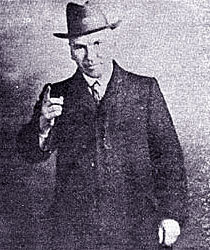
So here I am again. Back on the speakers’ platform; fingers twitching and mind racing.
In a few minutes I’m expected to give a rabble-rousing speech to the thousands upon thousands of people staring up at me, despite the fact that until yesterday I was languishing in the sewer called Peterhead Jail, despite the fact I’d been on hunger strike for eight months. But I’ll manage it. I will do it, just as I did it after prison the last time, 1916. For even now that the war is over there are still too many who don’t understand, who aren’t yet class conscious, who can’t see through the fog of capitalism. I will do it because however weak I am today, I am no longer being force-fed twice daily through rubber tubes.
I can hardly believe it’s only 1919. The trial seems such a long time ago. But it was really only a year ago. I was fit and robust then. I conducted my own defence. I spoke from the dock for an hour and a half, logically rebutting in turn each of the trumped up charges they laid against me. Defence of the Realm Act indeed. Then as now I said I wished no harm to any human being; that all my actions were entirely humanitarian in nature. But they insisted I was a threat to society, that I should be keen to kill my fellow workers in other countries, that I should be more patriotic. Patriotism - the last refuge of those scoundrels; Dr Johnson was right. And maybe it’s true that I did try to undermine their war effort, their drive to slaughter millions. I tried, just as my friends Karl Liebknecht and Rosa Luxembourg did in Germany. I was convicted of sedition, of trying to bring down the state, and sentenced to five years in the Peterhead hellhole. But now that the war has ended, I’m not such a threat, and in response to public clamour they set me free.

Was it all worth it? I suppose I should be grateful to have avoided the fate of my Edinburgh friend. James wanted to bring trade unionism and socialism to another part of the United Kingdom, the Ireland of his father and forefathers. Connolly was brought up among those Irish immigrants crammed into the caves under the arches of the city’s South Bridge. After fighting for workers’ rights against the Dublin lock-out he founded his Citizens’ Army. And in 1916, for his trouble, he ended up severely wounded, dragged up against a wall in Dublin Castle, and shot dead by soldiers. But I’m sure this country will find that’s not the end of the Irish story. Maybe that’s something Maybe that’s what I should tell them.
I still have my friends in Glasgow - Jimmy Maxton, Guy Aldred, and Willie Gallacher Jimmy’s the clever one. One day someone will probably write a doctoral thesis on Maxton’s thinking and end up as Prime Minister. And Guy, like me, he’s seen his fair share of courtrooms. America saw its way to amend its constitution with a Bill of Rights in 1791. But poor old Britain had to wait for Guy to be repeatedly arrested on this very Glasgow Green, for making speeches and gathering crowds, before the courts eventually agreed that public free speech, public meetings, and public processions really ought to be part of everyone’s civil liberties. And Willie, he’s seen the inside of prisons too, Willie still guides the unions, leading the Shop Stewards Movement on the Clyde. But he’s left his syndicalism behind, thrown in his lot with Lenin and Trotsky and founded the Communist Party of Great Britain. One of these days I can see him in Parliament, a Communist MP.
Looking at this huge crowd of people eagerly waiting to hear me speak I know many campaigned relentlessly for my release from prison. And now they expect a victorious call to arms, a vibrant, revolutionary speech, all fire and brimstone. They want to greet a Scottish Lenin at the Central Station rather than the Finland Station. But the prison regime has exhausted me and destroyed my body. And it wasn’t as if I hadn’t known hardship before, growing up in the poverty in Pollockshaws where my Gaelic speaking parents had landed up after being forced off their Highland land. In school they called me a lad o’ pairts, a clever wee boy. The Free Kirk arranged for me to be trained as a teacher. And after that I went on to Glasgow University and took my MA in Economics. But it was the terrible housing, poverty, and illness I saw all around me that drove me to a proper understanding of economics from a socialist perspective. It’s seventy years since Engels, in Manchester but writing in German, found himself forced to describe the awful condition of the working class. And fifty since Marx wrote about the Highland Clearances. Yet sometimes it’s hard to see that very much has changed.
Of course, when I started to speak in public about the need for reform, the need to redress the terrible ills of society, I was sacked from my teaching job. Then they barred me from teaching in schools altogether. Nothing daunted, I founded the Scottish Labour College to teach people about socialist economics. I espoused the co-operative movement. I got the Renfrewshire Co-op to push local school boards into providing facilities for adult education, economics education. During the war I did what I could to support Mary Barbour and the women’s fight against the rent increases, imposed by absentee landlords while their conscripted husbands were away fighting in France. Aye, one of these days they’ll put up a statue to that wonderful woman.
And now Willie Gallacher and the Clydeside workers have decided they have to strike again. Trying to reduce working hours to a forty hour week. And it’s not that they want the same pay for fewer hours. They’ll take a bit less pay. All they want is to make some room in the yards to give jobs to all the unemployed demobbed soldiers. But in Parliament they fear an uprising, a Glasgow Soviet, a Soviet Scotland. Churchill’s tanks are even now being marshalled in the Gallowgate. Thousands of English troops are arriving by train. Meanwhile, the Scottish troops are confined to barracks in Maryhill. And if Willie speaks to them at Maryhill he knows the troops will come out for him. Revolution is in the air. But I’ve told him, that kind of battle – workers in khaki killing other workers in khaki – that’s not for me, not what I want to see. If there are to be tanks on Sauchiehall Street they must be faced down without bloodshed. But can I convince this heaving crowd of that?
Like me, most of the people here couldn’t see what the so-called ‘war to end wars’ was all about, why everyone had to starve or die because of it. Just one imperial power slaughtering the workers of another imperial power as they tried to gain a bigger slice of the cake, the wealth of the exploited colonies, for the benefit of their own capitalist classes.
The Russian workers couldn’t understand it either. We all cheered when they abandoned the war in 1917 and overthrew their government. I well remember chairing the Third All-Russian Congress of Soviets. And then Lenin appointed me Bolshevik Consul in Scotland. I hear they’ve even named a street after me in St Petersburg, or Leningrad as they’re calling it nowadays. There’s even been talk of carving my name on the Kremlin’s walls. But what do those things matter – his ribbon, star, and a’ that?
I’m thirty-nine and feeling nearer ninety. The force-feeding when I went on hunger strike in prison didn’t help. Some even say they tried to poison me. Now they tell me pneumonia is setting in – that I’ll probably be dead in a year or two. People might remember me for a while, before I’m eclipsed by others; Scottish people better able to fight for socialism and independence, people who understand the true nature of Scotland. If my funeral attracts as big a crowd as the one before me now it will be the biggest funeral Glasgow has ever seen. Maybe I’ll be a footnote in some socialist history of Scotland, or someone might write a song, a poem, or a play about me. My dear wee daughter Nan says she’ll write a book about me. A hundred years from now will anyone read that passionate speech I made from the dock? Will that speech’s prediction – of another world war twenty years from now - prove true or false? Will the egalitarian principles I've lived and fought for ever really be able to establish themselves in an independent Scotland? Marx said capitalism forces companies to compete, to exploit resources and labour, and the devil take the hindmost. The losers are taken over, merged, or eliminated altogether, whatever the cost to the workers. Eventually there will be huge companies, but there won’t be many. I suspect, as Marx predicted, that companies will become global, capitalists billionaires, and the gap between rich and poor will only widen. Could an independent socialist Scotland really stand in their way?
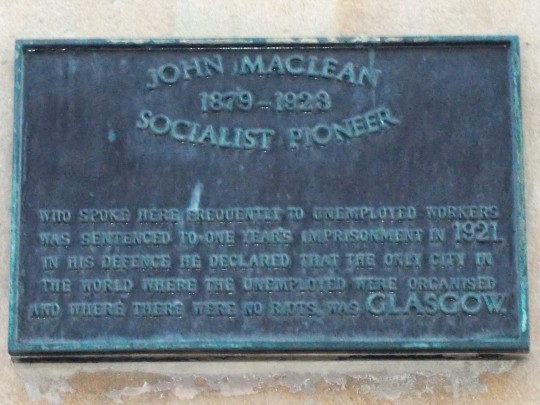
Ach, so I lost my safe middle-class teaching career, I lost my health. I gained a prison record. Have all those things really been for nothing? - But good grief, what kind of self-serving question is that for me to be asking myself?
Oh dear, the Convener is nodding towards me now. It’s time to get up on the old hind legs and give this multitude some eloquent words to chew over. Maybe their reaction will provide the answer to some of the questions tickling my brain.
#Reekie Revelator#short story#imaginary monologue#scotland#independence#socialism#john maclean (1879 - 1923)
1 note
·
View note